Digital Entrepreneurship: New Business Models Research Agenda
VerifiedAdded on 2022/11/25
|24
|14550
|416
Literature Review
AI Summary
This document is a literature review published in the International Journal of Entrepreneurial Behavior & Research, focusing on digital entrepreneurship. The review, authored by Kraus et al., examines the current state of research, identifies key topics, and proposes a research agenda for the 21st century. It explores the impact of digitalization on business models, including platform strategies and social digital entrepreneurship. The authors conducted a systematic literature review, identifying six key research streams: digital business models, digital entrepreneurship process, platform strategies, digital ecosystem, entrepreneurship education, and social digital entrepreneurship. The paper highlights the opportunities, challenges, and success factors in digital entrepreneurship, and provides a research map for future scholarly work. The review emphasizes the transformative effects of digitalization on business and the need for entrepreneurs and researchers to understand and adapt to the changing landscape. The study defines digital entrepreneurship and provides an overview of the methodology, including the search procedure and the structured review that elaborates on the impact of digitalization on business models and the digital entrepreneurship process.
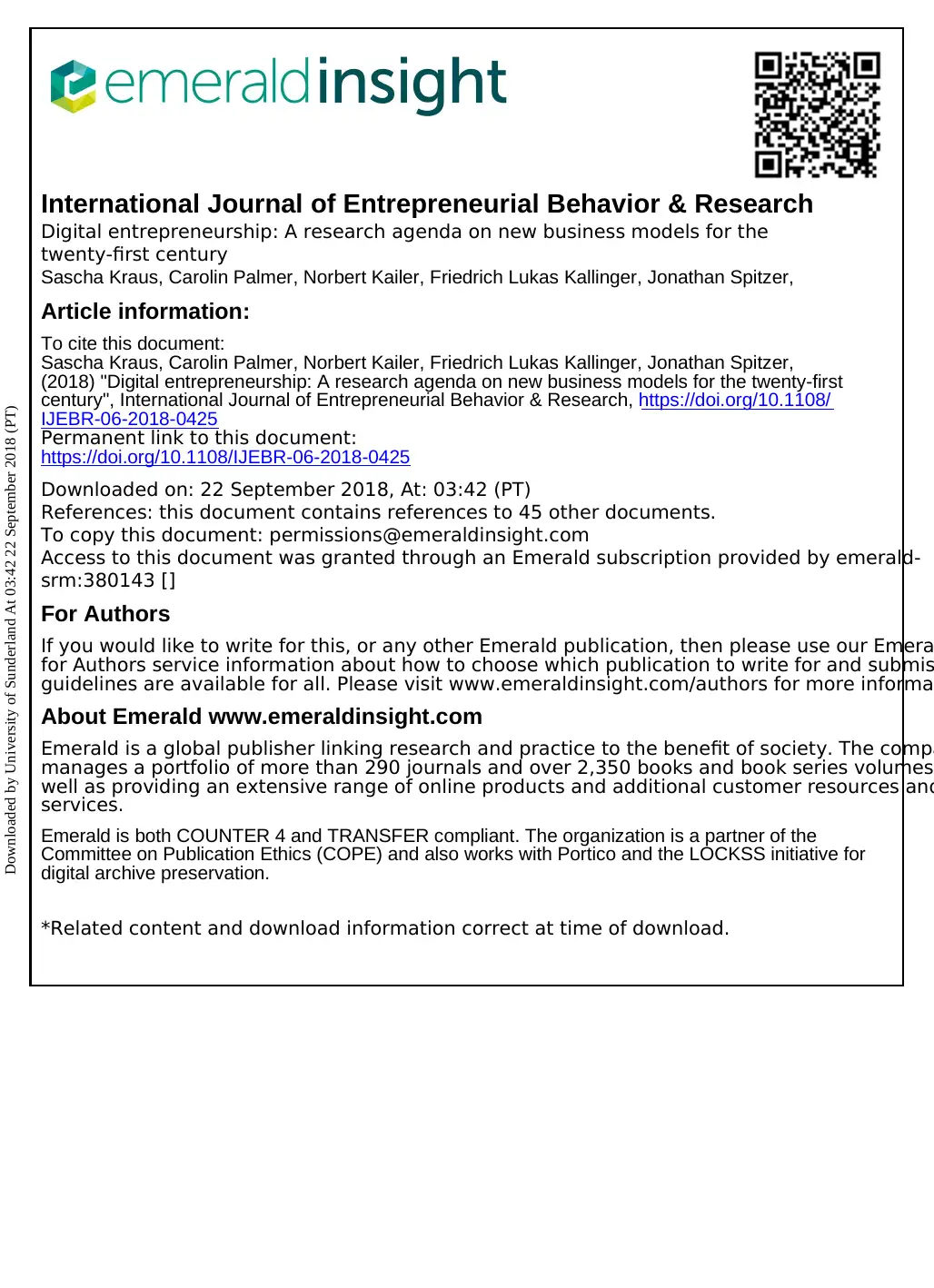
International Journal of Entrepreneurial Behavior & Research
Digital entrepreneurship: A research agenda on new business models for the
twenty-first century
Sascha Kraus, Carolin Palmer, Norbert Kailer, Friedrich Lukas Kallinger, Jonathan Spitzer,
Article information:
To cite this document:
Sascha Kraus, Carolin Palmer, Norbert Kailer, Friedrich Lukas Kallinger, Jonathan Spitzer,
(2018) "Digital entrepreneurship: A research agenda on new business models for the twenty-first
century", International Journal of Entrepreneurial Behavior & Research, https://doi.org/10.1108/
IJEBR-06-2018-0425
Permanent link to this document:
https://doi.org/10.1108/IJEBR-06-2018-0425
Downloaded on: 22 September 2018, At: 03:42 (PT)
References: this document contains references to 45 other documents.
To copy this document: permissions@emeraldinsight.com
Access to this document was granted through an Emerald subscription provided by emerald-
srm:380143 []
For Authors
If you would like to write for this, or any other Emerald publication, then please use our Emera
for Authors service information about how to choose which publication to write for and submis
guidelines are available for all. Please visit www.emeraldinsight.com/authors for more informa
About Emerald www.emeraldinsight.com
Emerald is a global publisher linking research and practice to the benefit of society. The compa
manages a portfolio of more than 290 journals and over 2,350 books and book series volumes
well as providing an extensive range of online products and additional customer resources and
services.
Emerald is both COUNTER 4 and TRANSFER compliant. The organization is a partner of the
Committee on Publication Ethics (COPE) and also works with Portico and the LOCKSS initiative for
digital archive preservation.
*Related content and download information correct at time of download.
Downloaded by University of Sunderland At 03:42 22 September 2018 (PT)
Digital entrepreneurship: A research agenda on new business models for the
twenty-first century
Sascha Kraus, Carolin Palmer, Norbert Kailer, Friedrich Lukas Kallinger, Jonathan Spitzer,
Article information:
To cite this document:
Sascha Kraus, Carolin Palmer, Norbert Kailer, Friedrich Lukas Kallinger, Jonathan Spitzer,
(2018) "Digital entrepreneurship: A research agenda on new business models for the twenty-first
century", International Journal of Entrepreneurial Behavior & Research, https://doi.org/10.1108/
IJEBR-06-2018-0425
Permanent link to this document:
https://doi.org/10.1108/IJEBR-06-2018-0425
Downloaded on: 22 September 2018, At: 03:42 (PT)
References: this document contains references to 45 other documents.
To copy this document: permissions@emeraldinsight.com
Access to this document was granted through an Emerald subscription provided by emerald-
srm:380143 []
For Authors
If you would like to write for this, or any other Emerald publication, then please use our Emera
for Authors service information about how to choose which publication to write for and submis
guidelines are available for all. Please visit www.emeraldinsight.com/authors for more informa
About Emerald www.emeraldinsight.com
Emerald is a global publisher linking research and practice to the benefit of society. The compa
manages a portfolio of more than 290 journals and over 2,350 books and book series volumes
well as providing an extensive range of online products and additional customer resources and
services.
Emerald is both COUNTER 4 and TRANSFER compliant. The organization is a partner of the
Committee on Publication Ethics (COPE) and also works with Portico and the LOCKSS initiative for
digital archive preservation.
*Related content and download information correct at time of download.
Downloaded by University of Sunderland At 03:42 22 September 2018 (PT)
Paraphrase This Document
Need a fresh take? Get an instant paraphrase of this document with our AI Paraphraser
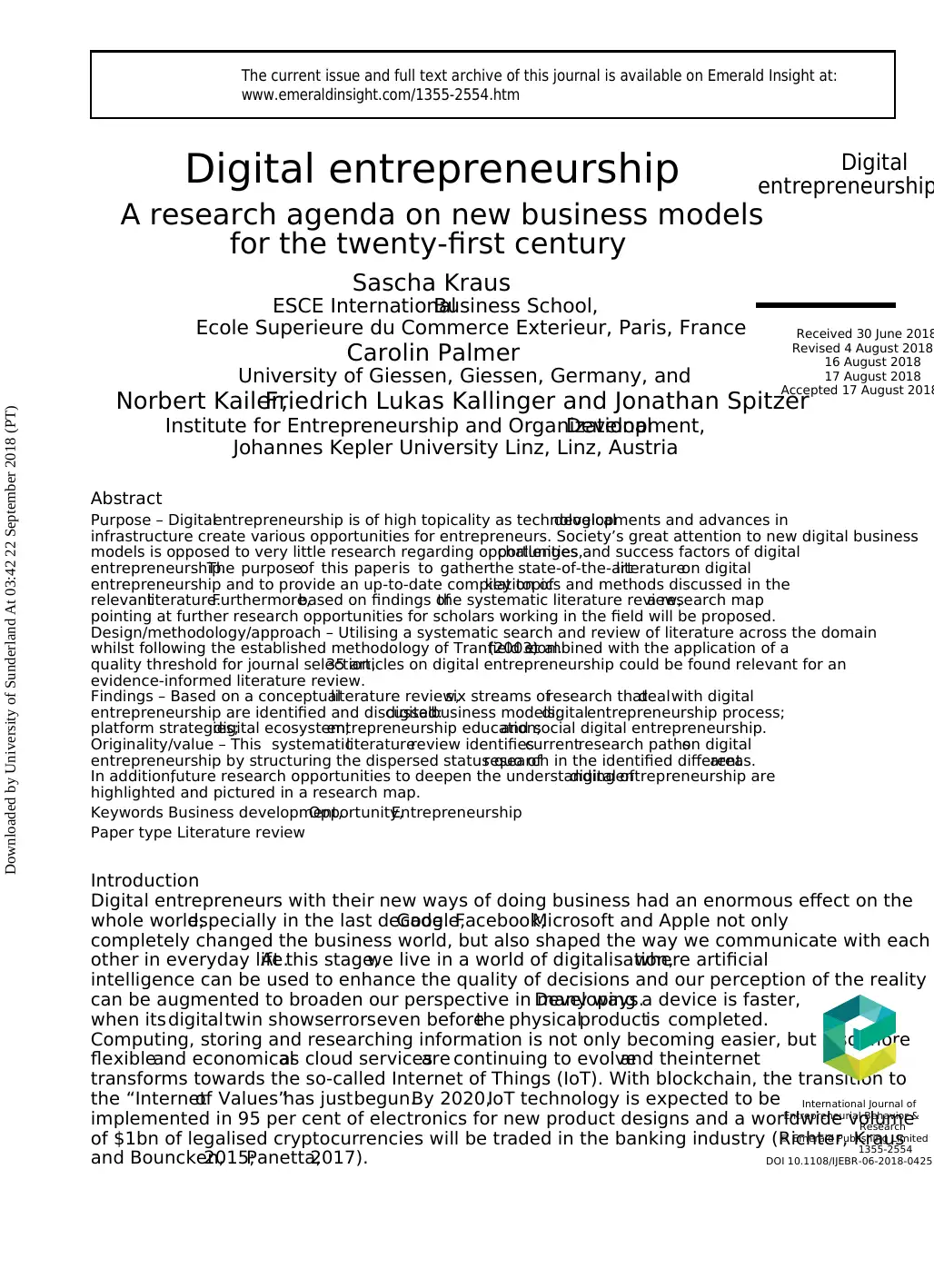
Digital entrepreneurship
A research agenda on new business models
for the twenty-first century
Sascha Kraus
ESCE InternationalBusiness School,
Ecole Superieure du Commerce Exterieur, Paris, France
Carolin Palmer
University of Giessen, Giessen, Germany, and
Norbert Kailer,Friedrich Lukas Kallinger and Jonathan Spitzer
Institute for Entrepreneurship and OrganizationalDevelopment,
Johannes Kepler University Linz, Linz, Austria
Abstract
Purpose – Digitalentrepreneurship is of high topicality as technologicaldevelopments and advances in
infrastructure create various opportunities for entrepreneurs. Society’s great attention to new digital business
models is opposed to very little research regarding opportunities,challenges and success factors of digital
entrepreneurship.The purposeof this paperis to gatherthe state-of-the-artliteratureon digital
entrepreneurship and to provide an up-to-date compilation ofkey topics and methods discussed in the
relevantliterature.Furthermore,based on findings ofthe systematic literature review,a research map
pointing at further research opportunities for scholars working in the field will be proposed.
Design/methodology/approach – Utilising a systematic search and review of literature across the domain
whilst following the established methodology of Tranfield et al.(2003)combined with the application of a
quality threshold for journal selection,35 articles on digital entrepreneurship could be found relevant for an
evidence-informed literature review.
Findings – Based on a conceptualliterature review,six streams ofresearch thatdealwith digital
entrepreneurship are identified and discussed:digitalbusiness models;digitalentrepreneurship process;
platform strategies;digital ecosystem;entrepreneurship education;and social digital entrepreneurship.
Originality/value – This systematicliteraturereview identifiescurrentresearch pathson digital
entrepreneurship by structuring the dispersed status quo ofresearch in the identified differentareas.
In addition,future research opportunities to deepen the understanding ofdigitalentrepreneurship are
highlighted and pictured in a research map.
Keywords Business development,Opportunity,Entrepreneurship
Paper type Literature review
Introduction
Digital entrepreneurs with their new ways of doing business had an enormous effect on the
whole world,especially in the last decade.Google,Facebook,Microsoft and Apple not only
completely changed the business world, but also shaped the way we communicate with each
other in everyday life.At this stage,we live in a world of digitalisation,where artificial
intelligence can be used to enhance the quality of decisions and our perception of the reality
can be augmented to broaden our perspective in many ways.Developing a device is faster,
when itsdigitaltwin showserrorseven beforethe physicalproductis completed.
Computing, storing and researching information is not only becoming easier, but also more
flexibleand economicalas cloud servicesare continuing to evolveand theinternet
transforms towards the so-called Internet of Things (IoT). With blockchain, the transition to
the “Internetof Values”has justbegun.By 2020,IoT technology is expected to be
implemented in 95 per cent of electronics for new product designs and a worldwide volume
of $1bn of legalised cryptocurrencies will be traded in the banking industry (Richter, Kraus
and Bouncken,2015;Panetta,2017).
International Journal of
Entrepreneurial Behavior &
Research
© Emerald Publishing Limited
1355-2554
DOI 10.1108/IJEBR-06-2018-0425
Received 30 June 2018
Revised 4 August 2018
16 August 2018
17 August 2018
Accepted 17 August 2018
The current issue and full text archive of this journal is available on Emerald Insight at:
www.emeraldinsight.com/1355-2554.htm
Digital
entrepreneurship
Downloaded by University of Sunderland At 03:42 22 September 2018 (PT)
A research agenda on new business models
for the twenty-first century
Sascha Kraus
ESCE InternationalBusiness School,
Ecole Superieure du Commerce Exterieur, Paris, France
Carolin Palmer
University of Giessen, Giessen, Germany, and
Norbert Kailer,Friedrich Lukas Kallinger and Jonathan Spitzer
Institute for Entrepreneurship and OrganizationalDevelopment,
Johannes Kepler University Linz, Linz, Austria
Abstract
Purpose – Digitalentrepreneurship is of high topicality as technologicaldevelopments and advances in
infrastructure create various opportunities for entrepreneurs. Society’s great attention to new digital business
models is opposed to very little research regarding opportunities,challenges and success factors of digital
entrepreneurship.The purposeof this paperis to gatherthe state-of-the-artliteratureon digital
entrepreneurship and to provide an up-to-date compilation ofkey topics and methods discussed in the
relevantliterature.Furthermore,based on findings ofthe systematic literature review,a research map
pointing at further research opportunities for scholars working in the field will be proposed.
Design/methodology/approach – Utilising a systematic search and review of literature across the domain
whilst following the established methodology of Tranfield et al.(2003)combined with the application of a
quality threshold for journal selection,35 articles on digital entrepreneurship could be found relevant for an
evidence-informed literature review.
Findings – Based on a conceptualliterature review,six streams ofresearch thatdealwith digital
entrepreneurship are identified and discussed:digitalbusiness models;digitalentrepreneurship process;
platform strategies;digital ecosystem;entrepreneurship education;and social digital entrepreneurship.
Originality/value – This systematicliteraturereview identifiescurrentresearch pathson digital
entrepreneurship by structuring the dispersed status quo ofresearch in the identified differentareas.
In addition,future research opportunities to deepen the understanding ofdigitalentrepreneurship are
highlighted and pictured in a research map.
Keywords Business development,Opportunity,Entrepreneurship
Paper type Literature review
Introduction
Digital entrepreneurs with their new ways of doing business had an enormous effect on the
whole world,especially in the last decade.Google,Facebook,Microsoft and Apple not only
completely changed the business world, but also shaped the way we communicate with each
other in everyday life.At this stage,we live in a world of digitalisation,where artificial
intelligence can be used to enhance the quality of decisions and our perception of the reality
can be augmented to broaden our perspective in many ways.Developing a device is faster,
when itsdigitaltwin showserrorseven beforethe physicalproductis completed.
Computing, storing and researching information is not only becoming easier, but also more
flexibleand economicalas cloud servicesare continuing to evolveand theinternet
transforms towards the so-called Internet of Things (IoT). With blockchain, the transition to
the “Internetof Values”has justbegun.By 2020,IoT technology is expected to be
implemented in 95 per cent of electronics for new product designs and a worldwide volume
of $1bn of legalised cryptocurrencies will be traded in the banking industry (Richter, Kraus
and Bouncken,2015;Panetta,2017).
International Journal of
Entrepreneurial Behavior &
Research
© Emerald Publishing Limited
1355-2554
DOI 10.1108/IJEBR-06-2018-0425
Received 30 June 2018
Revised 4 August 2018
16 August 2018
17 August 2018
Accepted 17 August 2018
The current issue and full text archive of this journal is available on Emerald Insight at:
www.emeraldinsight.com/1355-2554.htm
Digital
entrepreneurship
Downloaded by University of Sunderland At 03:42 22 September 2018 (PT)
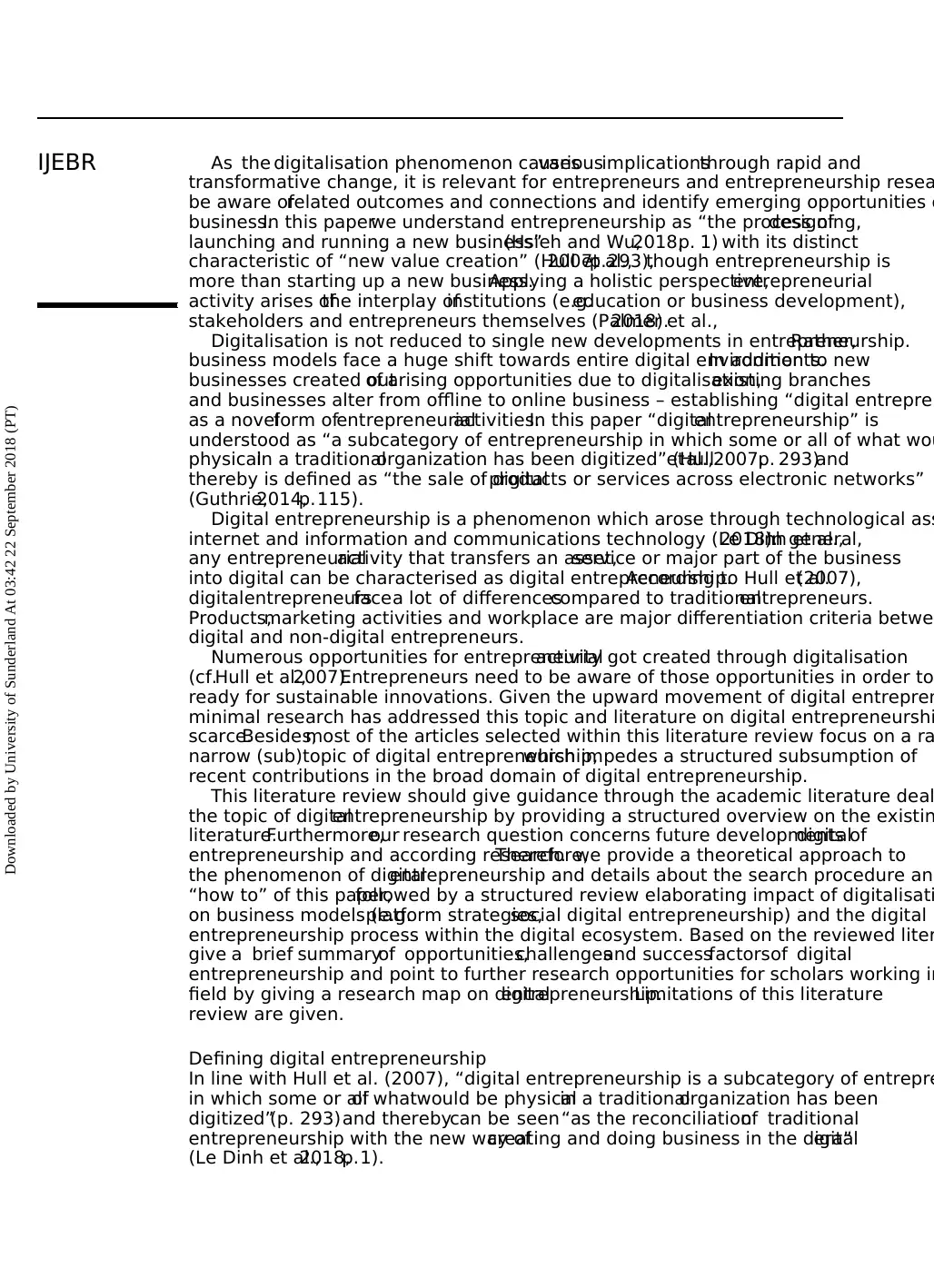
As the digitalisation phenomenon causesvariousimplicationsthrough rapid and
transformative change, it is relevant for entrepreneurs and entrepreneurship resea
be aware ofrelated outcomes and connections and identify emerging opportunities o
business.In this paperwe understand entrepreneurship as “the process ofdesigning,
launching and running a new business”(Hsieh and Wu,2018,p. 1) with its distinct
characteristic of “new value creation” (Hull et al.,2007,p.293),though entrepreneurship is
more than starting up a new business.Applying a holistic perspective,entrepreneurial
activity arises ofthe interplay ofinstitutions (e.g.education or business development),
stakeholders and entrepreneurs themselves (Palmer et al.,2018).
Digitalisation is not reduced to single new developments in entrepreneurship.Rather,
business models face a huge shift towards entire digital environments.In addition to new
businesses created outof arising opportunities due to digitalisation,existing branches
and businesses alter from offline to online business – establishing “digital entrepren
as a novelform ofentrepreneurialactivities.In this paper “digitalentrepreneurship” is
understood as “a subcategory of entrepreneurship in which some or all of what wou
physicalin a traditionalorganization has been digitized” (Hulletal.,2007,p. 293)and
thereby is defined as “the sale of digitalproducts or services across electronic networks”
(Guthrie,2014,p.115).
Digital entrepreneurship is a phenomenon which arose through technological ass
internet and information and communications technology (Le Dinh et al.,2018).In general,
any entrepreneurialactivity that transfers an asset,service or major part of the business
into digital can be characterised as digital entrepreneurship.According to Hull et al.(2007),
digitalentrepreneursfacea lot of differencescompared to traditionalentrepreneurs.
Products,marketing activities and workplace are major differentiation criteria betwe
digital and non-digital entrepreneurs.
Numerous opportunities for entrepreneurialactivity got created through digitalisation
(cf.Hull et al.,2007).Entrepreneurs need to be aware of those opportunities in order to
ready for sustainable innovations. Given the upward movement of digital entrepren
minimal research has addressed this topic and literature on digital entrepreneurshi
scarce.Besides,most of the articles selected within this literature review focus on a ra
narrow (sub)topic of digital entrepreneurship,which impedes a structured subsumption of
recent contributions in the broad domain of digital entrepreneurship.
This literature review should give guidance through the academic literature deal
the topic of digitalentrepreneurship by providing a structured overview on the existin
literature.Furthermore,our research question concerns future developments ofdigital
entrepreneurship and according research.Therefore,we provide a theoretical approach to
the phenomenon of digitalentrepreneurship and details about the search procedure and
“how to” of this paper,followed by a structured review elaborating impact of digitalisati
on business models (e.g.platform strategies,social digital entrepreneurship) and the digital
entrepreneurship process within the digital ecosystem. Based on the reviewed liter
give a brief summaryof opportunities,challengesand successfactorsof digital
entrepreneurship and point to further research opportunities for scholars working in
field by giving a research map on digitalentrepreneurship.Limitations of this literature
review are given.
Defining digital entrepreneurship
In line with Hull et al. (2007), “digital entrepreneurship is a subcategory of entrepre
in which some or allof whatwould be physicalin a traditionalorganization has been
digitized”(p. 293)and therebycan be seen“as the reconciliationof traditional
entrepreneurship with the new way ofcreating and doing business in the digitalera”
(Le Dinh et al.,2018,p.1).
IJEBR
Downloaded by University of Sunderland At 03:42 22 September 2018 (PT)
transformative change, it is relevant for entrepreneurs and entrepreneurship resea
be aware ofrelated outcomes and connections and identify emerging opportunities o
business.In this paperwe understand entrepreneurship as “the process ofdesigning,
launching and running a new business”(Hsieh and Wu,2018,p. 1) with its distinct
characteristic of “new value creation” (Hull et al.,2007,p.293),though entrepreneurship is
more than starting up a new business.Applying a holistic perspective,entrepreneurial
activity arises ofthe interplay ofinstitutions (e.g.education or business development),
stakeholders and entrepreneurs themselves (Palmer et al.,2018).
Digitalisation is not reduced to single new developments in entrepreneurship.Rather,
business models face a huge shift towards entire digital environments.In addition to new
businesses created outof arising opportunities due to digitalisation,existing branches
and businesses alter from offline to online business – establishing “digital entrepren
as a novelform ofentrepreneurialactivities.In this paper “digitalentrepreneurship” is
understood as “a subcategory of entrepreneurship in which some or all of what wou
physicalin a traditionalorganization has been digitized” (Hulletal.,2007,p. 293)and
thereby is defined as “the sale of digitalproducts or services across electronic networks”
(Guthrie,2014,p.115).
Digital entrepreneurship is a phenomenon which arose through technological ass
internet and information and communications technology (Le Dinh et al.,2018).In general,
any entrepreneurialactivity that transfers an asset,service or major part of the business
into digital can be characterised as digital entrepreneurship.According to Hull et al.(2007),
digitalentrepreneursfacea lot of differencescompared to traditionalentrepreneurs.
Products,marketing activities and workplace are major differentiation criteria betwe
digital and non-digital entrepreneurs.
Numerous opportunities for entrepreneurialactivity got created through digitalisation
(cf.Hull et al.,2007).Entrepreneurs need to be aware of those opportunities in order to
ready for sustainable innovations. Given the upward movement of digital entrepren
minimal research has addressed this topic and literature on digital entrepreneurshi
scarce.Besides,most of the articles selected within this literature review focus on a ra
narrow (sub)topic of digital entrepreneurship,which impedes a structured subsumption of
recent contributions in the broad domain of digital entrepreneurship.
This literature review should give guidance through the academic literature deal
the topic of digitalentrepreneurship by providing a structured overview on the existin
literature.Furthermore,our research question concerns future developments ofdigital
entrepreneurship and according research.Therefore,we provide a theoretical approach to
the phenomenon of digitalentrepreneurship and details about the search procedure and
“how to” of this paper,followed by a structured review elaborating impact of digitalisati
on business models (e.g.platform strategies,social digital entrepreneurship) and the digital
entrepreneurship process within the digital ecosystem. Based on the reviewed liter
give a brief summaryof opportunities,challengesand successfactorsof digital
entrepreneurship and point to further research opportunities for scholars working in
field by giving a research map on digitalentrepreneurship.Limitations of this literature
review are given.
Defining digital entrepreneurship
In line with Hull et al. (2007), “digital entrepreneurship is a subcategory of entrepre
in which some or allof whatwould be physicalin a traditionalorganization has been
digitized”(p. 293)and therebycan be seen“as the reconciliationof traditional
entrepreneurship with the new way ofcreating and doing business in the digitalera”
(Le Dinh et al.,2018,p.1).
IJEBR
Downloaded by University of Sunderland At 03:42 22 September 2018 (PT)
⊘ This is a preview!⊘
Do you want full access?
Subscribe today to unlock all pages.

Trusted by 1+ million students worldwide
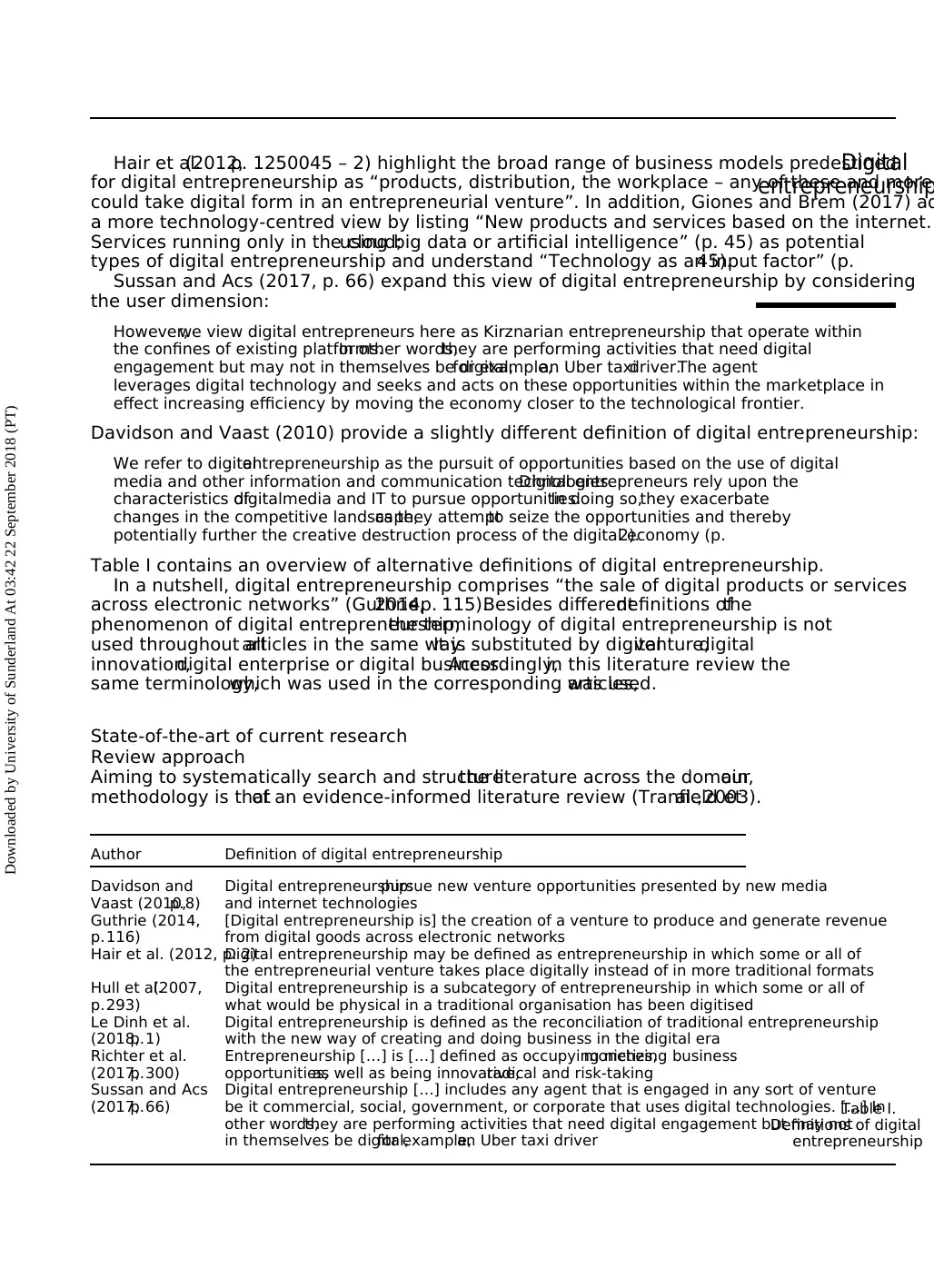
Hair et al.(2012,p. 1250045 – 2) highlight the broad range of business models predestined
for digital entrepreneurship as “products, distribution, the workplace – any of these and more
could take digital form in an entrepreneurial venture”. In addition, Giones and Brem (2017) ad
a more technology-centred view by listing “New products and services based on the internet.
Services running only in the cloud;using big data or artificial intelligence” (p. 45) as potential
types of digital entrepreneurship and understand “Technology as an input factor” (p.45).
Sussan and Acs (2017, p. 66) expand this view of digital entrepreneurship by considering
the user dimension:
However,we view digital entrepreneurs here as Kirznarian entrepreneurship that operate within
the confines of existing platforms.In other words,they are performing activities that need digital
engagement but may not in themselves be digital,for example,an Uber taxidriver.The agent
leverages digital technology and seeks and acts on these opportunities within the marketplace in
effect increasing efficiency by moving the economy closer to the technological frontier.
Davidson and Vaast (2010) provide a slightly different definition of digital entrepreneurship:
We refer to digitalentrepreneurship as the pursuit of opportunities based on the use of digital
media and other information and communication technologies.Digital entrepreneurs rely upon the
characteristics ofdigitalmedia and IT to pursue opportunities.In doing so,they exacerbate
changes in the competitive landscape,as they attemptto seize the opportunities and thereby
potentially further the creative destruction process of the digital economy (p.2).
Table I contains an overview of alternative definitions of digital entrepreneurship.
In a nutshell, digital entrepreneurship comprises “the sale of digital products or services
across electronic networks” (Guthrie,2014,p. 115).Besides differentdefinitions ofthe
phenomenon of digital entrepreneurship,the terminology of digital entrepreneurship is not
used throughout allarticles in the same way.It is substituted by digitalventure,digital
innovation,digital enterprise or digital business.Accordingly,in this literature review the
same terminology,which was used in the corresponding articles,was used.
State-of-the-art of current research
Review approach
Aiming to systematically search and structurethe literature across the domain,our
methodology is thatof an evidence-informed literature review (Tranfield etal.,2003).
Author Definition of digital entrepreneurship
Davidson and
Vaast (2010,p.8)
Digital entrepreneurship:pursue new venture opportunities presented by new media
and internet technologies
Guthrie (2014,
p.116)
[Digital entrepreneurship is] the creation of a venture to produce and generate revenue
from digital goods across electronic networks
Hair et al. (2012, p. 2)Digital entrepreneurship may be defined as entrepreneurship in which some or all of
the entrepreneurial venture takes place digitally instead of in more traditional formats
Hull et al.(2007,
p.293)
Digital entrepreneurship is a subcategory of entrepreneurship in which some or all of
what would be physical in a traditional organisation has been digitised
Le Dinh et al.
(2018,p.1)
Digital entrepreneurship is defined as the reconciliation of traditional entrepreneurship
with the new way of creating and doing business in the digital era
Richter et al.
(2017,p.300)
Entrepreneurship […] is […] defined as occupying niches,monetizing business
opportunities,as well as being innovative,radical and risk-taking
Sussan and Acs
(2017,p.66)
Digital entrepreneurship […] includes any agent that is engaged in any sort of venture
be it commercial, social, government, or corporate that uses digital technologies. […] In
other words,they are performing activities that need digital engagement but may not
in themselves be digital,for example,an Uber taxi driver
Table I.
Definitions of digital
entrepreneurship
Digital
entrepreneurship
Downloaded by University of Sunderland At 03:42 22 September 2018 (PT)
for digital entrepreneurship as “products, distribution, the workplace – any of these and more
could take digital form in an entrepreneurial venture”. In addition, Giones and Brem (2017) ad
a more technology-centred view by listing “New products and services based on the internet.
Services running only in the cloud;using big data or artificial intelligence” (p. 45) as potential
types of digital entrepreneurship and understand “Technology as an input factor” (p.45).
Sussan and Acs (2017, p. 66) expand this view of digital entrepreneurship by considering
the user dimension:
However,we view digital entrepreneurs here as Kirznarian entrepreneurship that operate within
the confines of existing platforms.In other words,they are performing activities that need digital
engagement but may not in themselves be digital,for example,an Uber taxidriver.The agent
leverages digital technology and seeks and acts on these opportunities within the marketplace in
effect increasing efficiency by moving the economy closer to the technological frontier.
Davidson and Vaast (2010) provide a slightly different definition of digital entrepreneurship:
We refer to digitalentrepreneurship as the pursuit of opportunities based on the use of digital
media and other information and communication technologies.Digital entrepreneurs rely upon the
characteristics ofdigitalmedia and IT to pursue opportunities.In doing so,they exacerbate
changes in the competitive landscape,as they attemptto seize the opportunities and thereby
potentially further the creative destruction process of the digital economy (p.2).
Table I contains an overview of alternative definitions of digital entrepreneurship.
In a nutshell, digital entrepreneurship comprises “the sale of digital products or services
across electronic networks” (Guthrie,2014,p. 115).Besides differentdefinitions ofthe
phenomenon of digital entrepreneurship,the terminology of digital entrepreneurship is not
used throughout allarticles in the same way.It is substituted by digitalventure,digital
innovation,digital enterprise or digital business.Accordingly,in this literature review the
same terminology,which was used in the corresponding articles,was used.
State-of-the-art of current research
Review approach
Aiming to systematically search and structurethe literature across the domain,our
methodology is thatof an evidence-informed literature review (Tranfield etal.,2003).
Author Definition of digital entrepreneurship
Davidson and
Vaast (2010,p.8)
Digital entrepreneurship:pursue new venture opportunities presented by new media
and internet technologies
Guthrie (2014,
p.116)
[Digital entrepreneurship is] the creation of a venture to produce and generate revenue
from digital goods across electronic networks
Hair et al. (2012, p. 2)Digital entrepreneurship may be defined as entrepreneurship in which some or all of
the entrepreneurial venture takes place digitally instead of in more traditional formats
Hull et al.(2007,
p.293)
Digital entrepreneurship is a subcategory of entrepreneurship in which some or all of
what would be physical in a traditional organisation has been digitised
Le Dinh et al.
(2018,p.1)
Digital entrepreneurship is defined as the reconciliation of traditional entrepreneurship
with the new way of creating and doing business in the digital era
Richter et al.
(2017,p.300)
Entrepreneurship […] is […] defined as occupying niches,monetizing business
opportunities,as well as being innovative,radical and risk-taking
Sussan and Acs
(2017,p.66)
Digital entrepreneurship […] includes any agent that is engaged in any sort of venture
be it commercial, social, government, or corporate that uses digital technologies. […] In
other words,they are performing activities that need digital engagement but may not
in themselves be digital,for example,an Uber taxi driver
Table I.
Definitions of digital
entrepreneurship
Digital
entrepreneurship
Downloaded by University of Sunderland At 03:42 22 September 2018 (PT)
Paraphrase This Document
Need a fresh take? Get an instant paraphrase of this document with our AI Paraphraser
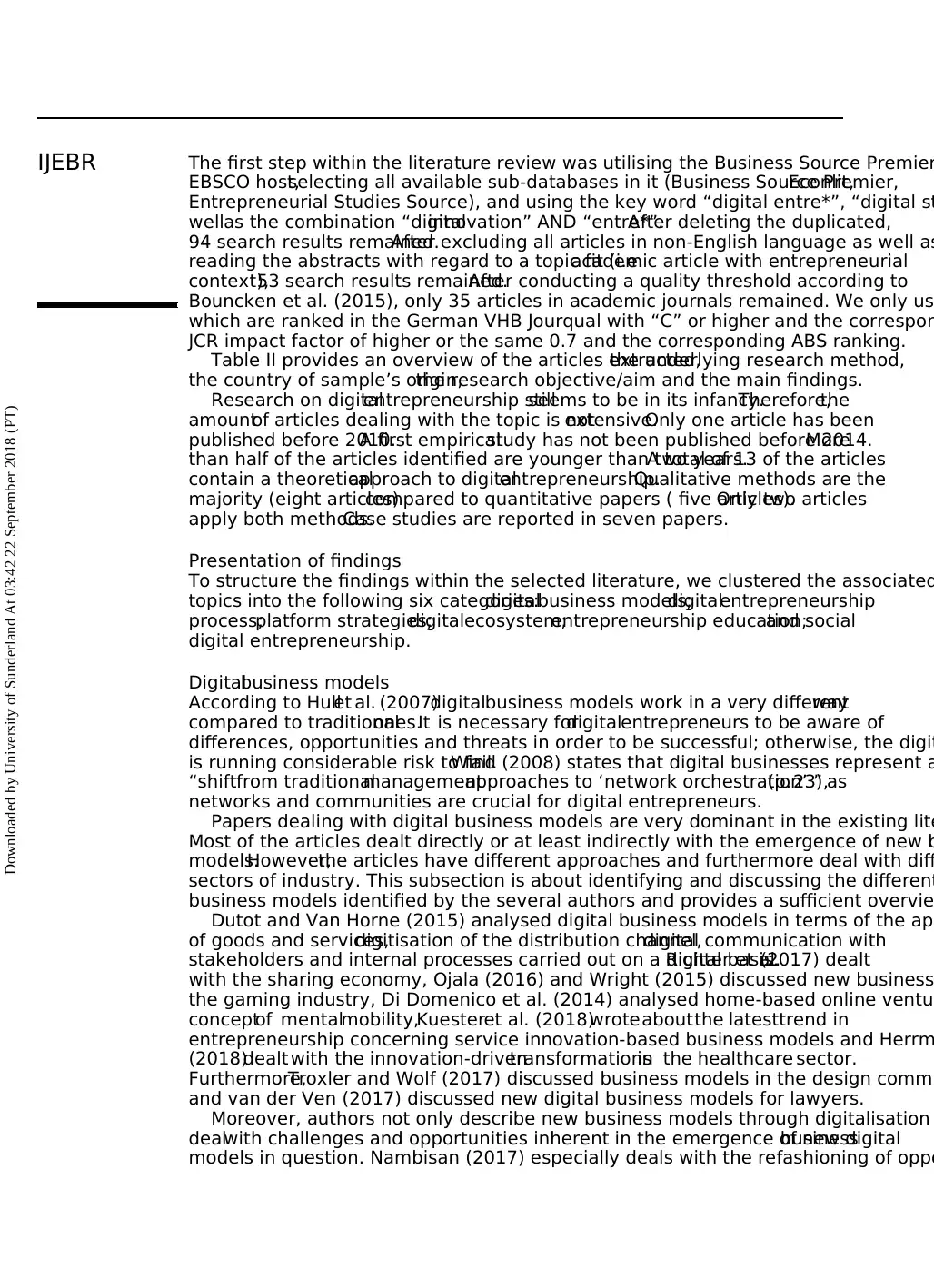
The first step within the literature review was utilising the Business Source Premier
EBSCO host,selecting all available sub-databases in it (Business Source Premier,Econlit,
Entrepreneurial Studies Source), and using the key word “digital entre*”, “digital st
wellas the combination “digitalinnovation” AND “entre*”.After deleting the duplicated,
94 search results remained.After excluding all articles in non-English language as well as
reading the abstracts with regard to a topic fit (i.e.academic article with entrepreneurial
context),53 search results remained.After conducting a quality threshold according to
Bouncken et al. (2015), only 35 articles in academic journals remained. We only us
which are ranked in the German VHB Jourqual with “C” or higher and the correspon
JCR impact factor of higher or the same 0.7 and the corresponding ABS ranking.
Table II provides an overview of the articles extracted,the underlying research method,
the country of sample’s origin,the research objective/aim and the main findings.
Research on digitalentrepreneurship stillseems to be in its infancy.Therefore,the
amountof articles dealing with the topic is notextensive.Only one article has been
published before 2010.A first empiricalstudy has not been published before 2014.More
than half of the articles identified are younger than two years.A total of 13 of the articles
contain a theoreticalapproach to digitalentrepreneurship.Qualitative methods are the
majority (eight articles)compared to quantitative papers ( five articles).Only two articles
apply both methods.Case studies are reported in seven papers.
Presentation of findings
To structure the findings within the selected literature, we clustered the associated
topics into the following six categories:digitalbusiness models;digitalentrepreneurship
process;platform strategies;digitalecosystem;entrepreneurship education;and social
digital entrepreneurship.
Digitalbusiness models
According to Hullet al. (2007)digitalbusiness models work in a very differentway
compared to traditionalones.It is necessary fordigitalentrepreneurs to be aware of
differences, opportunities and threats in order to be successful; otherwise, the digit
is running considerable risk to fail.Wind (2008) states that digital businesses represent a
“shiftfrom traditionalmanagementapproaches to ‘network orchestration’ ”(p. 23),as
networks and communities are crucial for digital entrepreneurs.
Papers dealing with digital business models are very dominant in the existing lite
Most of the articles dealt directly or at least indirectly with the emergence of new b
models.However,the articles have different approaches and furthermore deal with diff
sectors of industry. This subsection is about identifying and discussing the different
business models identified by the several authors and provides a sufficient overvie
Dutot and Van Horne (2015) analysed digital business models in terms of the ap
of goods and services,digitisation of the distribution channel,digital communication with
stakeholders and internal processes carried out on a digital basis.Richter et al.(2017) dealt
with the sharing economy, Ojala (2016) and Wright (2015) discussed new business
the gaming industry, Di Domenico et al. (2014) analysed home-based online ventu
conceptof mentalmobility,Kuesteret al. (2018)wroteaboutthe latesttrend in
entrepreneurship concerning service innovation-based business models and Herrm
(2018)dealt with the innovation-driventransformationsin the healthcare sector.
Furthermore,Troxler and Wolf (2017) discussed business models in the design commu
and van der Ven (2017) discussed new digital business models for lawyers.
Moreover, authors not only describe new business models through digitalisation
dealwith challenges and opportunities inherent in the emergence of new digitalbusiness
models in question. Nambisan (2017) especially deals with the refashioning of oppo
IJEBR
Downloaded by University of Sunderland At 03:42 22 September 2018 (PT)
EBSCO host,selecting all available sub-databases in it (Business Source Premier,Econlit,
Entrepreneurial Studies Source), and using the key word “digital entre*”, “digital st
wellas the combination “digitalinnovation” AND “entre*”.After deleting the duplicated,
94 search results remained.After excluding all articles in non-English language as well as
reading the abstracts with regard to a topic fit (i.e.academic article with entrepreneurial
context),53 search results remained.After conducting a quality threshold according to
Bouncken et al. (2015), only 35 articles in academic journals remained. We only us
which are ranked in the German VHB Jourqual with “C” or higher and the correspon
JCR impact factor of higher or the same 0.7 and the corresponding ABS ranking.
Table II provides an overview of the articles extracted,the underlying research method,
the country of sample’s origin,the research objective/aim and the main findings.
Research on digitalentrepreneurship stillseems to be in its infancy.Therefore,the
amountof articles dealing with the topic is notextensive.Only one article has been
published before 2010.A first empiricalstudy has not been published before 2014.More
than half of the articles identified are younger than two years.A total of 13 of the articles
contain a theoreticalapproach to digitalentrepreneurship.Qualitative methods are the
majority (eight articles)compared to quantitative papers ( five articles).Only two articles
apply both methods.Case studies are reported in seven papers.
Presentation of findings
To structure the findings within the selected literature, we clustered the associated
topics into the following six categories:digitalbusiness models;digitalentrepreneurship
process;platform strategies;digitalecosystem;entrepreneurship education;and social
digital entrepreneurship.
Digitalbusiness models
According to Hullet al. (2007)digitalbusiness models work in a very differentway
compared to traditionalones.It is necessary fordigitalentrepreneurs to be aware of
differences, opportunities and threats in order to be successful; otherwise, the digit
is running considerable risk to fail.Wind (2008) states that digital businesses represent a
“shiftfrom traditionalmanagementapproaches to ‘network orchestration’ ”(p. 23),as
networks and communities are crucial for digital entrepreneurs.
Papers dealing with digital business models are very dominant in the existing lite
Most of the articles dealt directly or at least indirectly with the emergence of new b
models.However,the articles have different approaches and furthermore deal with diff
sectors of industry. This subsection is about identifying and discussing the different
business models identified by the several authors and provides a sufficient overvie
Dutot and Van Horne (2015) analysed digital business models in terms of the ap
of goods and services,digitisation of the distribution channel,digital communication with
stakeholders and internal processes carried out on a digital basis.Richter et al.(2017) dealt
with the sharing economy, Ojala (2016) and Wright (2015) discussed new business
the gaming industry, Di Domenico et al. (2014) analysed home-based online ventu
conceptof mentalmobility,Kuesteret al. (2018)wroteaboutthe latesttrend in
entrepreneurship concerning service innovation-based business models and Herrm
(2018)dealt with the innovation-driventransformationsin the healthcare sector.
Furthermore,Troxler and Wolf (2017) discussed business models in the design commu
and van der Ven (2017) discussed new digital business models for lawyers.
Moreover, authors not only describe new business models through digitalisation
dealwith challenges and opportunities inherent in the emergence of new digitalbusiness
models in question. Nambisan (2017) especially deals with the refashioning of oppo
IJEBR
Downloaded by University of Sunderland At 03:42 22 September 2018 (PT)
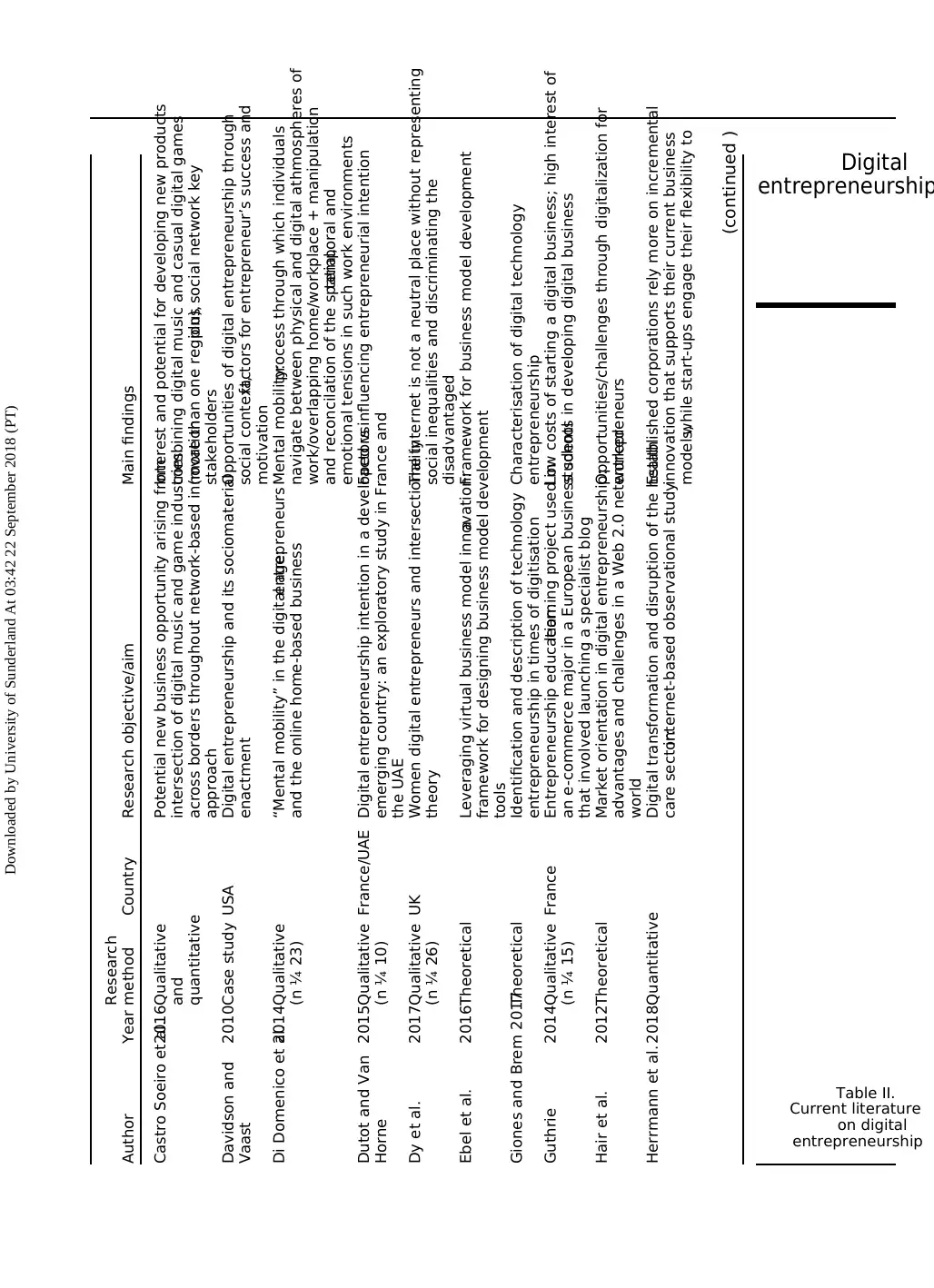
Author Year
Research
method Country Research objective/aim Main findings
Castro Soeiro et al.2016Qualitative
and
quantitative
Potential new business opportunity arising from
intersection of digital music and game industries
across borders throughout network-based innovation
approach
Interest and potential for developing new products
combining digital music and casual digital games
(more than one region),plus social network key
stakeholders
Davidson and
Vaast
2010Case study USA Digital entrepreneurship and its sociomaterial
enactment
Opportunities of digital entrepreneurship through
social context,factors for entrepreneur’s success and
motivation
Di Domenico et al.2014Qualitative
(n ¼ 23)
“Mental mobility” in the digital age:entrepreneurs
and the online home-based business
Mental mobility:process through which individuals
navigate between physical and digital athmospheres of
work/overlapping home/workplace + manipulation
and reconcilation of the spatial,temporal and
emotional tensions in such work environments
Dutot and Van
Horne
2015Qualitative
(n ¼ 10)
France/UAE Digital entrepreneurship intention in a developed vs
emerging country: an exploratory study in France and
the UAE
Factors influencing entrepreneurial intention
Dy et al. 2017Qualitative
(n ¼ 26)
UK Women digital entrepreneurs and intersectionality
theory
The internet is not a neutral place without representing
social inequalities and discriminating the
disadvantaged
Ebel et al. 2016Theoretical Leveraging virtual business model innovation:a
framework for designing business model development
tools
Framework for business model development
Giones and Brem 2017Theoretical Identification and description of technology
entrepreneurship in times of digitisation
Characterisation of digital technology
entrepreneurship
Guthrie 2014Qualitative
(n ¼ 15)
France Entrepreneurship education:learning project used in
an e-commerce major in a European business school
that involved launching a specialist blog
Low costs of starting a digital business; high interest of
students in developing digital business
Hair et al. 2012Theoretical Market orientation in digital entrepreneurship:
advantages and challenges in a Web 2.0 networked
world
Opportunities/challenges through digitalization for
entrepreneurs
Herrmann et al. 2018Quantitative Digital transformation and disruption of the health
care sector:internet-based observational study
Established corporations rely more on incremental
innovation that supports their current business
models,while start-ups engage their flexibility to
(continued )
Table II.
Current literature
on digital
entrepreneurship
Digital
entrepreneurship
Downloaded by University of Sunderland At 03:42 22 September 2018 (PT)
Research
method Country Research objective/aim Main findings
Castro Soeiro et al.2016Qualitative
and
quantitative
Potential new business opportunity arising from
intersection of digital music and game industries
across borders throughout network-based innovation
approach
Interest and potential for developing new products
combining digital music and casual digital games
(more than one region),plus social network key
stakeholders
Davidson and
Vaast
2010Case study USA Digital entrepreneurship and its sociomaterial
enactment
Opportunities of digital entrepreneurship through
social context,factors for entrepreneur’s success and
motivation
Di Domenico et al.2014Qualitative
(n ¼ 23)
“Mental mobility” in the digital age:entrepreneurs
and the online home-based business
Mental mobility:process through which individuals
navigate between physical and digital athmospheres of
work/overlapping home/workplace + manipulation
and reconcilation of the spatial,temporal and
emotional tensions in such work environments
Dutot and Van
Horne
2015Qualitative
(n ¼ 10)
France/UAE Digital entrepreneurship intention in a developed vs
emerging country: an exploratory study in France and
the UAE
Factors influencing entrepreneurial intention
Dy et al. 2017Qualitative
(n ¼ 26)
UK Women digital entrepreneurs and intersectionality
theory
The internet is not a neutral place without representing
social inequalities and discriminating the
disadvantaged
Ebel et al. 2016Theoretical Leveraging virtual business model innovation:a
framework for designing business model development
tools
Framework for business model development
Giones and Brem 2017Theoretical Identification and description of technology
entrepreneurship in times of digitisation
Characterisation of digital technology
entrepreneurship
Guthrie 2014Qualitative
(n ¼ 15)
France Entrepreneurship education:learning project used in
an e-commerce major in a European business school
that involved launching a specialist blog
Low costs of starting a digital business; high interest of
students in developing digital business
Hair et al. 2012Theoretical Market orientation in digital entrepreneurship:
advantages and challenges in a Web 2.0 networked
world
Opportunities/challenges through digitalization for
entrepreneurs
Herrmann et al. 2018Quantitative Digital transformation and disruption of the health
care sector:internet-based observational study
Established corporations rely more on incremental
innovation that supports their current business
models,while start-ups engage their flexibility to
(continued )
Table II.
Current literature
on digital
entrepreneurship
Digital
entrepreneurship
Downloaded by University of Sunderland At 03:42 22 September 2018 (PT)
⊘ This is a preview!⊘
Do you want full access?
Subscribe today to unlock all pages.

Trusted by 1+ million students worldwide
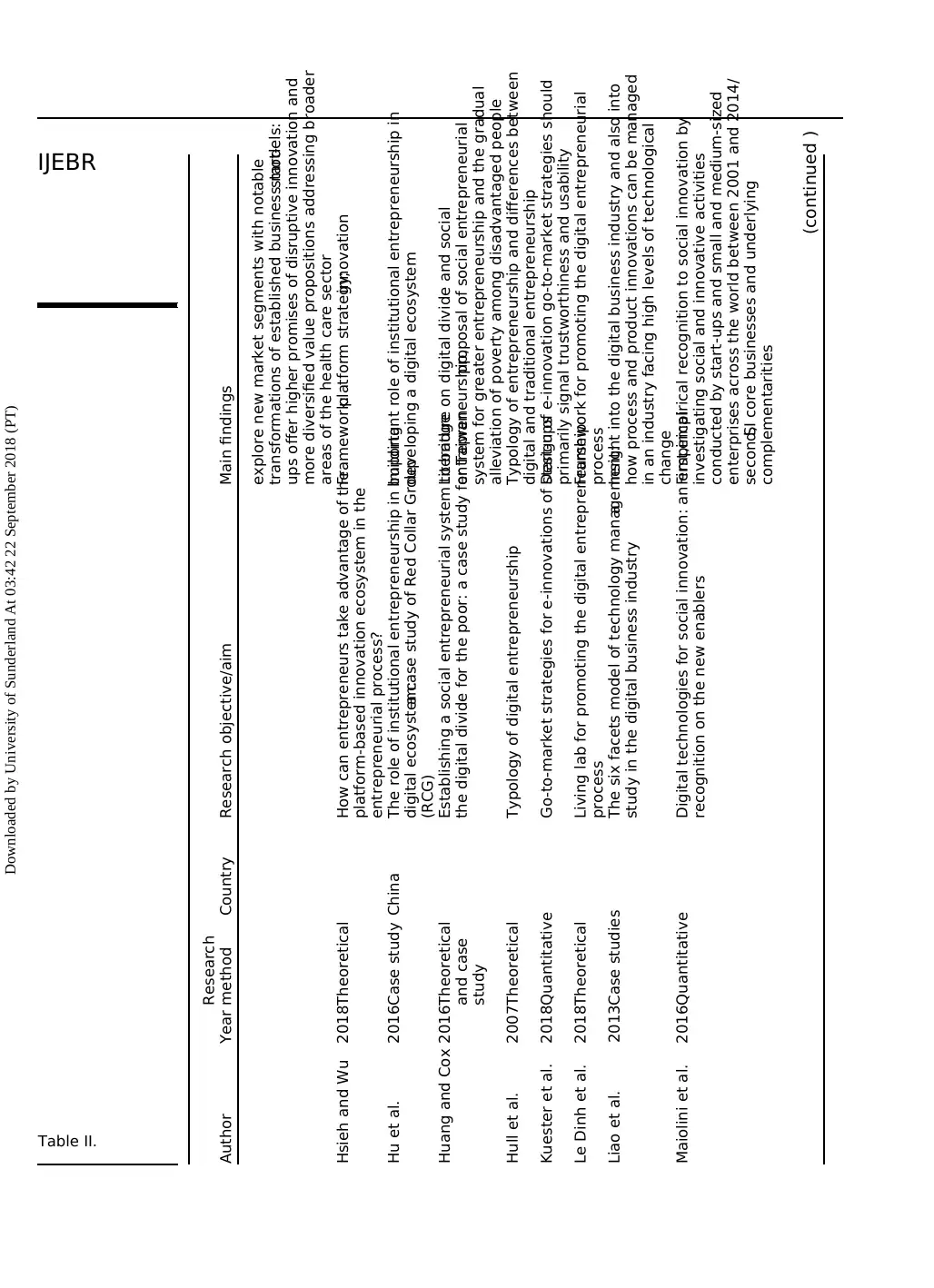
Author Year
Research
method Country Research objective/aim Main findings
explore new market segments with notable
transformations of established business models:start-
ups offer higher promises of disruptive innovation and
more diversified value propositions addressing broader
areas of the health care sector
Hsieh and Wu 2018Theoretical How can entrepreneurs take advantage of the
platform-based innovation ecosystem in the
entrepreneurial process?
Framework:platform strategy;innovation
Hu et al. 2016Case study China The role of institutional entrepreneurship in building
digital ecosystem:a case study of Red Collar Group
(RCG)
Important role of institutional entrepreneurship in
developing a digital ecosystem
Huang and Cox 2016Theoretical
and case
study
Establishing a social entrepreneurial system to bridge
the digital divide for the poor: a case study for Taiwan
Literature on digital divide and social
entrepreneurship,proposal of social entrepreneurial
system for greater entrepreneurship and the gradual
alleviation of poverty among disadvantaged people
Hull et al. 2007Theoretical Typology of digital entrepreneurship Typology of entrepreneurship and differences between
digital and traditional entrepreneurship
Kuester et al. 2018Quantitative Go-to-market strategies for e-innovations of start-upsDesign of e-innovation go-to-market strategies should
primarily signal trustworthiness and usability
Le Dinh et al. 2018Theoretical Living lab for promoting the digital entrepreneurship
process
Framework for promoting the digital entrepreneurial
process
Liao et al. 2013Case studies The six facets model of technology management:a
study in the digital business industry
Insight into the digital business industry and also into
how process and product innovations can be managed
in an industry facing high levels of technological
change
Maiolini et al. 2016Quantitative Digital technologies for social innovation: an empirical
recognition on the new enablers
First,empirical recognition to social innovation by
investigating social and innovative activities
conducted by start-ups and small and medium-sized
enterprises across the world between 2001 and 2014/
second,SI core businesses and underlying
complementarities
(continued )
Table II.
IJEBR
Downloaded by University of Sunderland At 03:42 22 September 2018 (PT)
Research
method Country Research objective/aim Main findings
explore new market segments with notable
transformations of established business models:start-
ups offer higher promises of disruptive innovation and
more diversified value propositions addressing broader
areas of the health care sector
Hsieh and Wu 2018Theoretical How can entrepreneurs take advantage of the
platform-based innovation ecosystem in the
entrepreneurial process?
Framework:platform strategy;innovation
Hu et al. 2016Case study China The role of institutional entrepreneurship in building
digital ecosystem:a case study of Red Collar Group
(RCG)
Important role of institutional entrepreneurship in
developing a digital ecosystem
Huang and Cox 2016Theoretical
and case
study
Establishing a social entrepreneurial system to bridge
the digital divide for the poor: a case study for Taiwan
Literature on digital divide and social
entrepreneurship,proposal of social entrepreneurial
system for greater entrepreneurship and the gradual
alleviation of poverty among disadvantaged people
Hull et al. 2007Theoretical Typology of digital entrepreneurship Typology of entrepreneurship and differences between
digital and traditional entrepreneurship
Kuester et al. 2018Quantitative Go-to-market strategies for e-innovations of start-upsDesign of e-innovation go-to-market strategies should
primarily signal trustworthiness and usability
Le Dinh et al. 2018Theoretical Living lab for promoting the digital entrepreneurship
process
Framework for promoting the digital entrepreneurial
process
Liao et al. 2013Case studies The six facets model of technology management:a
study in the digital business industry
Insight into the digital business industry and also into
how process and product innovations can be managed
in an industry facing high levels of technological
change
Maiolini et al. 2016Quantitative Digital technologies for social innovation: an empirical
recognition on the new enablers
First,empirical recognition to social innovation by
investigating social and innovative activities
conducted by start-ups and small and medium-sized
enterprises across the world between 2001 and 2014/
second,SI core businesses and underlying
complementarities
(continued )
Table II.
IJEBR
Downloaded by University of Sunderland At 03:42 22 September 2018 (PT)
Paraphrase This Document
Need a fresh take? Get an instant paraphrase of this document with our AI Paraphraser
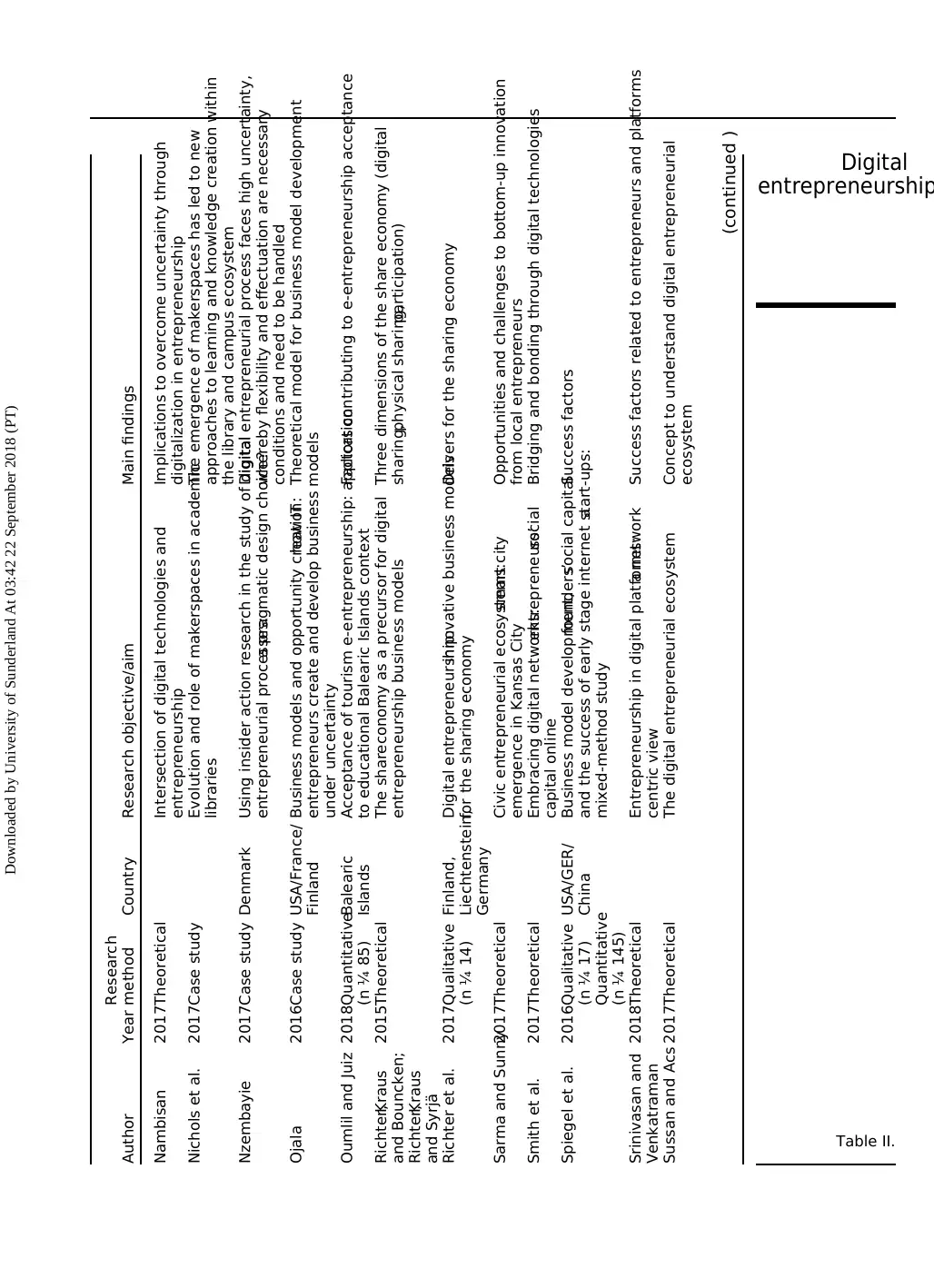
Author Year
Research
method Country Research objective/aim Main findings
Nambisan 2017Theoretical Intersection of digital technologies and
entrepreneurship
Implications to overcome uncertainty through
digitalization in entrepreneurship
Nichols et al. 2017Case study Evolution and role of makerspaces in academic
libraries
The emergence of makerspaces has led to new
approaches to learning and knowledge creation within
the library and campus ecosystem
Nzembayie 2017Case study Denmark Using insider action research in the study of digital
entrepreneurial processes:a pragmatic design choice?
Digital entrepreneurial process faces high uncertainty,
whereby flexibility and effectuation are necessary
conditions and need to be handled
Ojala 2016Case study USA/France/
Finland
Business models and opportunity creation:how IT
entrepreneurs create and develop business models
under uncertainty
Theoretical model for business model development
Oumlil and Juiz 2018Quantitative
(n ¼ 85)
Balearic
Islands
Acceptance of tourism e-entrepreneurship: application
to educational Balearic Islands context
Factors contributing to e-entrepreneurship acceptance
Richter,Kraus
and Bouncken;
Richter,Kraus
and Syrjä
2015Theoretical The shareconomy as a precursor for digital
entrepreneurship business models
Three dimensions of the share economy (digital
sharing,physical sharing,participation)
Richter et al. 2017Qualitative
(n ¼ 14)
Finland,
Liechtenstein,
Germany
Digital entrepreneurship:innovative business models
for the sharing economy
Drivers for the sharing economy
Sarma and Sunny2017Theoretical Civic entrepreneurial ecosystems:smart city
emergence in Kansas City
Opportunities and challenges to bottom-up innovation
from local entrepreneurs
Smith et al. 2017Theoretical Embracing digital networks:entrepreneurs’social
capital online
Bridging and bonding through digital technologies
Spiegel et al. 2016Qualitative
(n ¼ 17)
Quantitative
(n ¼ 145)
USA/GER/
China
Business model development,founders’social capital
and the success of early stage internet start-ups:a
mixed-method study
Success factors
Srinivasan and
Venkatraman
2018Theoretical Entrepreneurship in digital platforms:a network
centric view
Success factors related to entrepreneurs and platforms
Sussan and Acs 2017Theoretical The digital entrepreneurial ecosystem Concept to understand digital entrepreneurial
ecosystem
(continued )
Table II.
Digital
entrepreneurship
Downloaded by University of Sunderland At 03:42 22 September 2018 (PT)
Research
method Country Research objective/aim Main findings
Nambisan 2017Theoretical Intersection of digital technologies and
entrepreneurship
Implications to overcome uncertainty through
digitalization in entrepreneurship
Nichols et al. 2017Case study Evolution and role of makerspaces in academic
libraries
The emergence of makerspaces has led to new
approaches to learning and knowledge creation within
the library and campus ecosystem
Nzembayie 2017Case study Denmark Using insider action research in the study of digital
entrepreneurial processes:a pragmatic design choice?
Digital entrepreneurial process faces high uncertainty,
whereby flexibility and effectuation are necessary
conditions and need to be handled
Ojala 2016Case study USA/France/
Finland
Business models and opportunity creation:how IT
entrepreneurs create and develop business models
under uncertainty
Theoretical model for business model development
Oumlil and Juiz 2018Quantitative
(n ¼ 85)
Balearic
Islands
Acceptance of tourism e-entrepreneurship: application
to educational Balearic Islands context
Factors contributing to e-entrepreneurship acceptance
Richter,Kraus
and Bouncken;
Richter,Kraus
and Syrjä
2015Theoretical The shareconomy as a precursor for digital
entrepreneurship business models
Three dimensions of the share economy (digital
sharing,physical sharing,participation)
Richter et al. 2017Qualitative
(n ¼ 14)
Finland,
Liechtenstein,
Germany
Digital entrepreneurship:innovative business models
for the sharing economy
Drivers for the sharing economy
Sarma and Sunny2017Theoretical Civic entrepreneurial ecosystems:smart city
emergence in Kansas City
Opportunities and challenges to bottom-up innovation
from local entrepreneurs
Smith et al. 2017Theoretical Embracing digital networks:entrepreneurs’social
capital online
Bridging and bonding through digital technologies
Spiegel et al. 2016Qualitative
(n ¼ 17)
Quantitative
(n ¼ 145)
USA/GER/
China
Business model development,founders’social capital
and the success of early stage internet start-ups:a
mixed-method study
Success factors
Srinivasan and
Venkatraman
2018Theoretical Entrepreneurship in digital platforms:a network
centric view
Success factors related to entrepreneurs and platforms
Sussan and Acs 2017Theoretical The digital entrepreneurial ecosystem Concept to understand digital entrepreneurial
ecosystem
(continued )
Table II.
Digital
entrepreneurship
Downloaded by University of Sunderland At 03:42 22 September 2018 (PT)
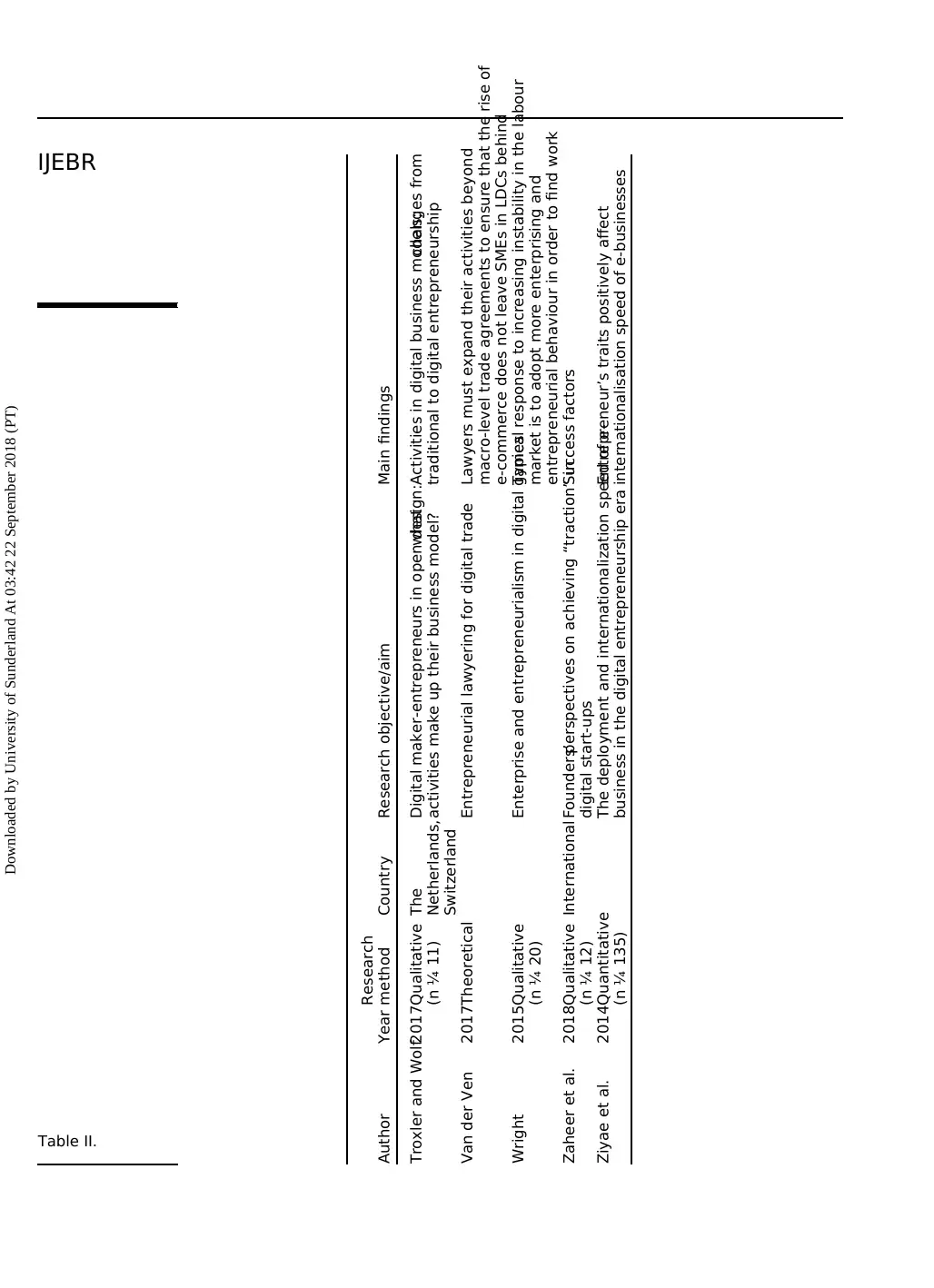
Author Year
Research
method Country Research objective/aim Main findings
Troxler and Wolf2017Qualitative
(n ¼ 11)
The
Netherlands,
Switzerland
Digital maker-entrepreneurs in open design:what
activities make up their business model?
Activities in digital business models;changes from
traditional to digital entrepreneurship
Van der Ven 2017Theoretical Entrepreneurial lawyering for digital trade Lawyers must expand their activities beyond
macro-level trade agreements to ensure that the rise of
e-commerce does not leave SMEs in LDCs behind
Wright 2015Qualitative
(n ¼ 20)
Enterprise and entrepreneurialism in digital gamesTypical response to increasing instability in the labour
market is to adopt more enterprising and
entrepreneurial behaviour in order to find work
Zaheer et al. 2018Qualitative
(n ¼ 12)
International Founders’perspectives on achieving “traction” in
digital start-ups
Success factors
Ziyae et al. 2014Quantitative
(n ¼ 135)
The deployment and internationalization speed of e-
business in the digital entrepreneurship era
Entrepreneur’s traits positively affect
internationalisation speed of e-businesses
Table II.
IJEBR
Downloaded by University of Sunderland At 03:42 22 September 2018 (PT)
Research
method Country Research objective/aim Main findings
Troxler and Wolf2017Qualitative
(n ¼ 11)
The
Netherlands,
Switzerland
Digital maker-entrepreneurs in open design:what
activities make up their business model?
Activities in digital business models;changes from
traditional to digital entrepreneurship
Van der Ven 2017Theoretical Entrepreneurial lawyering for digital trade Lawyers must expand their activities beyond
macro-level trade agreements to ensure that the rise of
e-commerce does not leave SMEs in LDCs behind
Wright 2015Qualitative
(n ¼ 20)
Enterprise and entrepreneurialism in digital gamesTypical response to increasing instability in the labour
market is to adopt more enterprising and
entrepreneurial behaviour in order to find work
Zaheer et al. 2018Qualitative
(n ¼ 12)
International Founders’perspectives on achieving “traction” in
digital start-ups
Success factors
Ziyae et al. 2014Quantitative
(n ¼ 135)
The deployment and internationalization speed of e-
business in the digital entrepreneurship era
Entrepreneur’s traits positively affect
internationalisation speed of e-businesses
Table II.
IJEBR
Downloaded by University of Sunderland At 03:42 22 September 2018 (PT)
⊘ This is a preview!⊘
Do you want full access?
Subscribe today to unlock all pages.

Trusted by 1+ million students worldwide
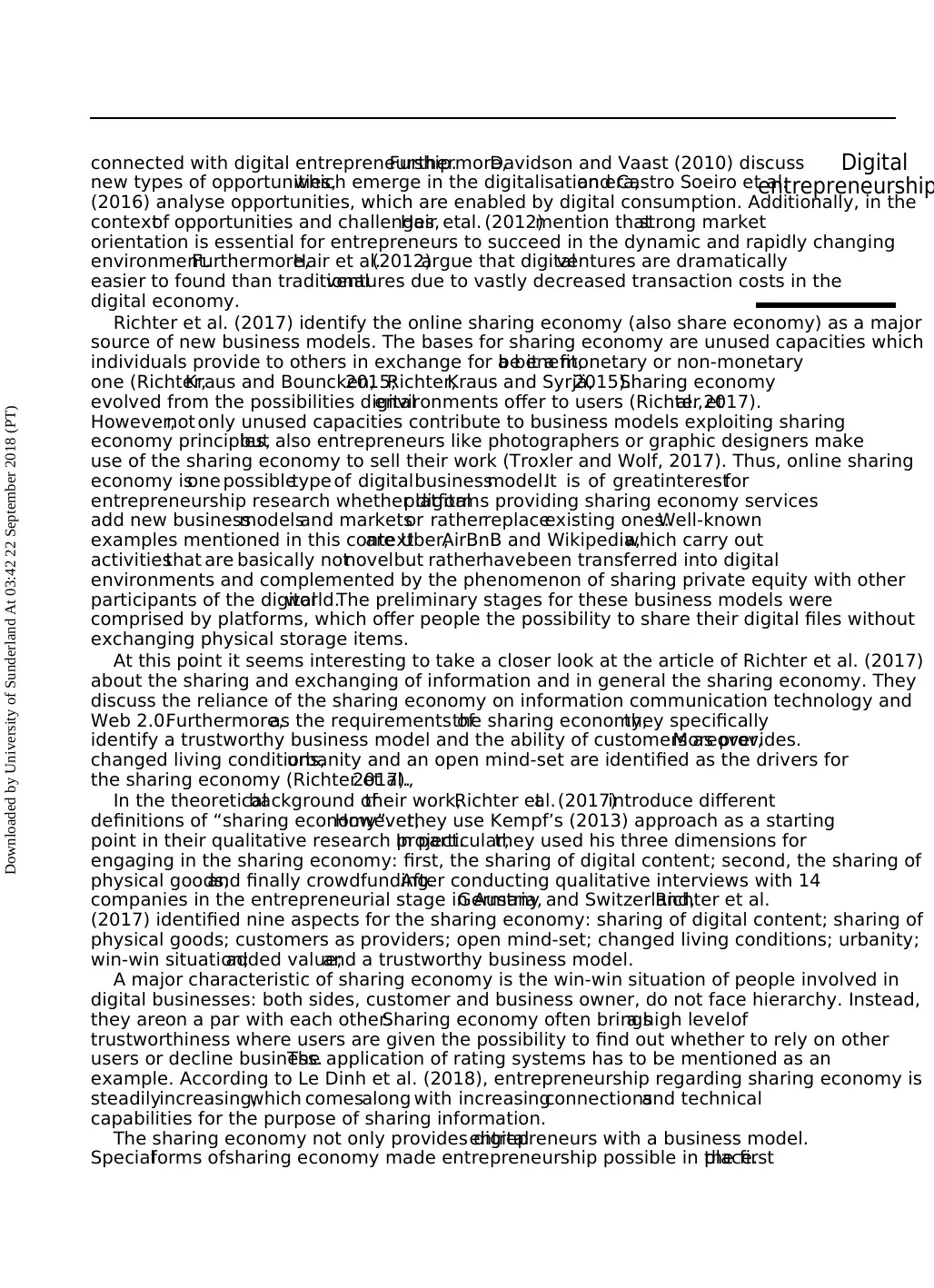
connected with digital entrepreneurship.Furthermore,Davidson and Vaast (2010) discuss
new types of opportunities,which emerge in the digitalisation era,and Castro Soeiro et al.
(2016) analyse opportunities, which are enabled by digital consumption. Additionally, in the
contextof opportunities and challenges,Hair etal. (2012)mention thatstrong market
orientation is essential for entrepreneurs to succeed in the dynamic and rapidly changing
environment.Furthermore,Hair et al.(2012)argue that digitalventures are dramatically
easier to found than traditionalventures due to vastly decreased transaction costs in the
digital economy.
Richter et al. (2017) identify the online sharing economy (also share economy) as a major
source of new business models. The bases for sharing economy are unused capacities which
individuals provide to others in exchange for a benefit,be it a monetary or non-monetary
one (Richter,Kraus and Bouncken,2015;Richter,Kraus and Syrjä,2015).Sharing economy
evolved from the possibilities digitalenvironments offer to users (Richter etal.,2017).
However,not only unused capacities contribute to business models exploiting sharing
economy principles,but also entrepreneurs like photographers or graphic designers make
use of the sharing economy to sell their work (Troxler and Wolf, 2017). Thus, online sharing
economy isone possibletype of digitalbusinessmodel.It is of greatinterestfor
entrepreneurship research whether digitalplatforms providing sharing economy services
add new businessmodelsand marketsor ratherreplaceexisting ones.Well-known
examples mentioned in this contextare Uber,AirBnB and Wikipedia,which carry out
activitiesthat are basically notnovelbut ratherhavebeen transferred into digital
environments and complemented by the phenomenon of sharing private equity with other
participants of the digitalworld.The preliminary stages for these business models were
comprised by platforms, which offer people the possibility to share their digital files without
exchanging physical storage items.
At this point it seems interesting to take a closer look at the article of Richter et al. (2017)
about the sharing and exchanging of information and in general the sharing economy. They
discuss the reliance of the sharing economy on information communication technology and
Web 2.0.Furthermore,as the requirements ofthe sharing economy,they specifically
identify a trustworthy business model and the ability of customers as provides.Moreover,
changed living conditions,urbanity and an open mind-set are identified as the drivers for
the sharing economy (Richter et al.,2017).
In the theoreticalbackground oftheir work,Richter etal. (2017)introduce different
definitions of “sharing economy”.However,they use Kempf’s (2013) approach as a starting
point in their qualitative research project.In particular,they used his three dimensions for
engaging in the sharing economy: first, the sharing of digital content; second, the sharing of
physical goods;and finally crowdfunding.After conducting qualitative interviews with 14
companies in the entrepreneurial stage in Austria,Germany and Switzerland,Richter et al.
(2017) identified nine aspects for the sharing economy: sharing of digital content; sharing of
physical goods; customers as providers; open mind-set; changed living conditions; urbanity;
win-win situation;added value;and a trustworthy business model.
A major characteristic of sharing economy is the win-win situation of people involved in
digital businesses: both sides, customer and business owner, do not face hierarchy. Instead,
they areon a par with each other.Sharing economy often bringsa high levelof
trustworthiness where users are given the possibility to find out whether to rely on other
users or decline business.The application of rating systems has to be mentioned as an
example. According to Le Dinh et al. (2018), entrepreneurship regarding sharing economy is
steadilyincreasing,which comesalong with increasingconnectionsand technical
capabilities for the purpose of sharing information.
The sharing economy not only provides digitalentrepreneurs with a business model.
Specialforms ofsharing economy made entrepreneurship possible in the firstplace.
Digital
entrepreneurship
Downloaded by University of Sunderland At 03:42 22 September 2018 (PT)
new types of opportunities,which emerge in the digitalisation era,and Castro Soeiro et al.
(2016) analyse opportunities, which are enabled by digital consumption. Additionally, in the
contextof opportunities and challenges,Hair etal. (2012)mention thatstrong market
orientation is essential for entrepreneurs to succeed in the dynamic and rapidly changing
environment.Furthermore,Hair et al.(2012)argue that digitalventures are dramatically
easier to found than traditionalventures due to vastly decreased transaction costs in the
digital economy.
Richter et al. (2017) identify the online sharing economy (also share economy) as a major
source of new business models. The bases for sharing economy are unused capacities which
individuals provide to others in exchange for a benefit,be it a monetary or non-monetary
one (Richter,Kraus and Bouncken,2015;Richter,Kraus and Syrjä,2015).Sharing economy
evolved from the possibilities digitalenvironments offer to users (Richter etal.,2017).
However,not only unused capacities contribute to business models exploiting sharing
economy principles,but also entrepreneurs like photographers or graphic designers make
use of the sharing economy to sell their work (Troxler and Wolf, 2017). Thus, online sharing
economy isone possibletype of digitalbusinessmodel.It is of greatinterestfor
entrepreneurship research whether digitalplatforms providing sharing economy services
add new businessmodelsand marketsor ratherreplaceexisting ones.Well-known
examples mentioned in this contextare Uber,AirBnB and Wikipedia,which carry out
activitiesthat are basically notnovelbut ratherhavebeen transferred into digital
environments and complemented by the phenomenon of sharing private equity with other
participants of the digitalworld.The preliminary stages for these business models were
comprised by platforms, which offer people the possibility to share their digital files without
exchanging physical storage items.
At this point it seems interesting to take a closer look at the article of Richter et al. (2017)
about the sharing and exchanging of information and in general the sharing economy. They
discuss the reliance of the sharing economy on information communication technology and
Web 2.0.Furthermore,as the requirements ofthe sharing economy,they specifically
identify a trustworthy business model and the ability of customers as provides.Moreover,
changed living conditions,urbanity and an open mind-set are identified as the drivers for
the sharing economy (Richter et al.,2017).
In the theoreticalbackground oftheir work,Richter etal. (2017)introduce different
definitions of “sharing economy”.However,they use Kempf’s (2013) approach as a starting
point in their qualitative research project.In particular,they used his three dimensions for
engaging in the sharing economy: first, the sharing of digital content; second, the sharing of
physical goods;and finally crowdfunding.After conducting qualitative interviews with 14
companies in the entrepreneurial stage in Austria,Germany and Switzerland,Richter et al.
(2017) identified nine aspects for the sharing economy: sharing of digital content; sharing of
physical goods; customers as providers; open mind-set; changed living conditions; urbanity;
win-win situation;added value;and a trustworthy business model.
A major characteristic of sharing economy is the win-win situation of people involved in
digital businesses: both sides, customer and business owner, do not face hierarchy. Instead,
they areon a par with each other.Sharing economy often bringsa high levelof
trustworthiness where users are given the possibility to find out whether to rely on other
users or decline business.The application of rating systems has to be mentioned as an
example. According to Le Dinh et al. (2018), entrepreneurship regarding sharing economy is
steadilyincreasing,which comesalong with increasingconnectionsand technical
capabilities for the purpose of sharing information.
The sharing economy not only provides digitalentrepreneurs with a business model.
Specialforms ofsharing economy made entrepreneurship possible in the firstplace.
Digital
entrepreneurship
Downloaded by University of Sunderland At 03:42 22 September 2018 (PT)
Paraphrase This Document
Need a fresh take? Get an instant paraphrase of this document with our AI Paraphraser
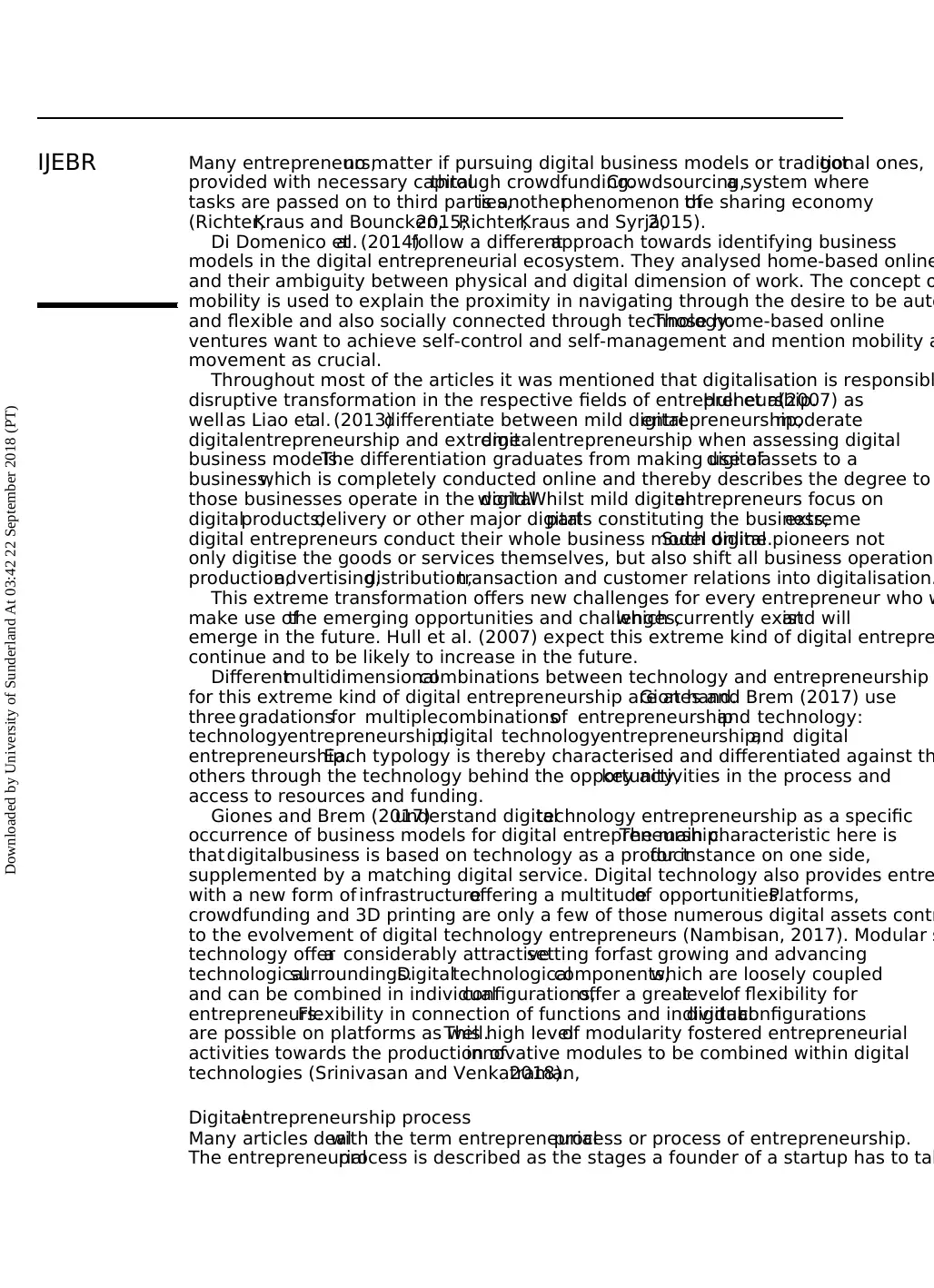
Many entrepreneurs,no matter if pursuing digital business models or traditional ones,got
provided with necessary capitalthrough crowdfunding.Crowdsourcing,a system where
tasks are passed on to third parties,is anotherphenomenon ofthe sharing economy
(Richter,Kraus and Bouncken,2015;Richter,Kraus and Syrjä,2015).
Di Domenico etal. (2014)follow a differentapproach towards identifying business
models in the digital entrepreneurial ecosystem. They analysed home-based online
and their ambiguity between physical and digital dimension of work. The concept o
mobility is used to explain the proximity in navigating through the desire to be auto
and flexible and also socially connected through technology.Those home-based online
ventures want to achieve self-control and self-management and mention mobility a
movement as crucial.
Throughout most of the articles it was mentioned that digitalisation is responsibl
disruptive transformation in the respective fields of entrepreneurship.Hull et al.(2007) as
wellas Liao etal. (2013)differentiate between mild digitalentrepreneurship,moderate
digitalentrepreneurship and extremedigitalentrepreneurship when assessing digital
business models.The differentiation graduates from making use ofdigitalassets to a
business,which is completely conducted online and thereby describes the degree to
those businesses operate in the digitalworld.Whilst mild digitalentrepreneurs focus on
digitalproducts,delivery or other major digitalparts constituting the business,extreme
digital entrepreneurs conduct their whole business model online.Such digital pioneers not
only digitise the goods or services themselves, but also shift all business operations
production,advertising,distribution,transaction and customer relations into digitalisation.
This extreme transformation offers new challenges for every entrepreneur who w
make use ofthe emerging opportunities and challenges,which currently existand will
emerge in the future. Hull et al. (2007) expect this extreme kind of digital entrepre
continue and to be likely to increase in the future.
Differentmultidimensionalcombinations between technology and entrepreneurship
for this extreme kind of digital entrepreneurship are at hand.Giones and Brem (2017) use
three gradationsfor multiplecombinationsof entrepreneurshipand technology:
technologyentrepreneurship;digital technologyentrepreneurship;and digital
entrepreneurship.Each typology is thereby characterised and differentiated against th
others through the technology behind the opportunity,key activities in the process and
access to resources and funding.
Giones and Brem (2017)understand digitaltechnology entrepreneurship as a specific
occurrence of business models for digital entrepreneurship.The main characteristic here is
that digitalbusiness is based on technology as a productfor instance on one side,
supplemented by a matching digital service. Digital technology also provides entre
with a new form of infrastructureoffering a multitudeof opportunities.Platforms,
crowdfunding and 3D printing are only a few of those numerous digital assets contr
to the evolvement of digital technology entrepreneurs (Nambisan, 2017). Modular s
technology offera considerably attractivesetting forfast growing and advancing
technologicalsurroundings.Digitaltechnologicalcomponents,which are loosely coupled
and can be combined in individualconfigurations,offer a greatlevelof flexibility for
entrepreneurs.Flexibility in connection of functions and individualdigitalconfigurations
are possible on platforms as well.This high levelof modularity fostered entrepreneurial
activities towards the production ofinnovative modules to be combined within digital
technologies (Srinivasan and Venkatraman,2018).
Digitalentrepreneurship process
Many articles dealwith the term entrepreneurialprocess or process of entrepreneurship.
The entrepreneurialprocess is described as the stages a founder of a startup has to tak
IJEBR
Downloaded by University of Sunderland At 03:42 22 September 2018 (PT)
provided with necessary capitalthrough crowdfunding.Crowdsourcing,a system where
tasks are passed on to third parties,is anotherphenomenon ofthe sharing economy
(Richter,Kraus and Bouncken,2015;Richter,Kraus and Syrjä,2015).
Di Domenico etal. (2014)follow a differentapproach towards identifying business
models in the digital entrepreneurial ecosystem. They analysed home-based online
and their ambiguity between physical and digital dimension of work. The concept o
mobility is used to explain the proximity in navigating through the desire to be auto
and flexible and also socially connected through technology.Those home-based online
ventures want to achieve self-control and self-management and mention mobility a
movement as crucial.
Throughout most of the articles it was mentioned that digitalisation is responsibl
disruptive transformation in the respective fields of entrepreneurship.Hull et al.(2007) as
wellas Liao etal. (2013)differentiate between mild digitalentrepreneurship,moderate
digitalentrepreneurship and extremedigitalentrepreneurship when assessing digital
business models.The differentiation graduates from making use ofdigitalassets to a
business,which is completely conducted online and thereby describes the degree to
those businesses operate in the digitalworld.Whilst mild digitalentrepreneurs focus on
digitalproducts,delivery or other major digitalparts constituting the business,extreme
digital entrepreneurs conduct their whole business model online.Such digital pioneers not
only digitise the goods or services themselves, but also shift all business operations
production,advertising,distribution,transaction and customer relations into digitalisation.
This extreme transformation offers new challenges for every entrepreneur who w
make use ofthe emerging opportunities and challenges,which currently existand will
emerge in the future. Hull et al. (2007) expect this extreme kind of digital entrepre
continue and to be likely to increase in the future.
Differentmultidimensionalcombinations between technology and entrepreneurship
for this extreme kind of digital entrepreneurship are at hand.Giones and Brem (2017) use
three gradationsfor multiplecombinationsof entrepreneurshipand technology:
technologyentrepreneurship;digital technologyentrepreneurship;and digital
entrepreneurship.Each typology is thereby characterised and differentiated against th
others through the technology behind the opportunity,key activities in the process and
access to resources and funding.
Giones and Brem (2017)understand digitaltechnology entrepreneurship as a specific
occurrence of business models for digital entrepreneurship.The main characteristic here is
that digitalbusiness is based on technology as a productfor instance on one side,
supplemented by a matching digital service. Digital technology also provides entre
with a new form of infrastructureoffering a multitudeof opportunities.Platforms,
crowdfunding and 3D printing are only a few of those numerous digital assets contr
to the evolvement of digital technology entrepreneurs (Nambisan, 2017). Modular s
technology offera considerably attractivesetting forfast growing and advancing
technologicalsurroundings.Digitaltechnologicalcomponents,which are loosely coupled
and can be combined in individualconfigurations,offer a greatlevelof flexibility for
entrepreneurs.Flexibility in connection of functions and individualdigitalconfigurations
are possible on platforms as well.This high levelof modularity fostered entrepreneurial
activities towards the production ofinnovative modules to be combined within digital
technologies (Srinivasan and Venkatraman,2018).
Digitalentrepreneurship process
Many articles dealwith the term entrepreneurialprocess or process of entrepreneurship.
The entrepreneurialprocess is described as the stages a founder of a startup has to tak
IJEBR
Downloaded by University of Sunderland At 03:42 22 September 2018 (PT)
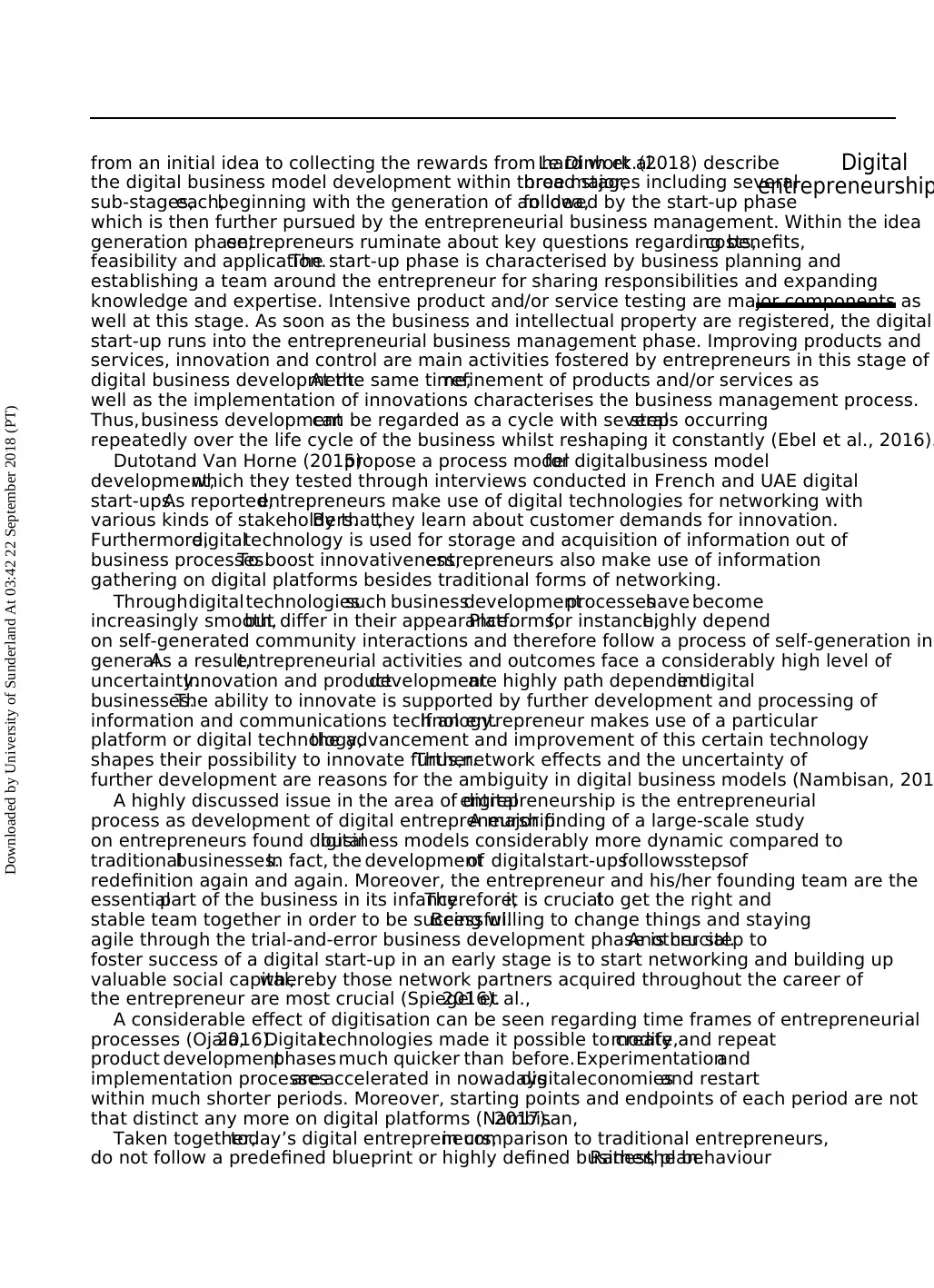
from an initial idea to collecting the rewards from hard work.Le Dinh et al.(2018) describe
the digital business model development within three major,broad stages including several
sub-stages,each,beginning with the generation of an idea,followed by the start-up phase
which is then further pursued by the entrepreneurial business management. Within the idea
generation phase,entrepreneurs ruminate about key questions regarding benefits,costs,
feasibility and application.The start-up phase is characterised by business planning and
establishing a team around the entrepreneur for sharing responsibilities and expanding
knowledge and expertise. Intensive product and/or service testing are major components as
well at this stage. As soon as the business and intellectual property are registered, the digital
start-up runs into the entrepreneurial business management phase. Improving products and
services, innovation and control are main activities fostered by entrepreneurs in this stage of
digital business development.At the same time,refinement of products and/or services as
well as the implementation of innovations characterises the business management process.
Thus,business developmentcan be regarded as a cycle with severalsteps occurring
repeatedly over the life cycle of the business whilst reshaping it constantly (Ebel et al., 2016).
Dutotand Van Horne (2015)propose a process modelfor digitalbusiness model
development,which they tested through interviews conducted in French and UAE digital
start-ups.As reported,entrepreneurs make use of digital technologies for networking with
various kinds of stakeholders.By that,they learn about customer demands for innovation.
Furthermore,digitaltechnology is used for storage and acquisition of information out of
business processes.To boost innovativeness,entrepreneurs also make use of information
gathering on digital platforms besides traditional forms of networking.
Throughdigitaltechnologiessuch businessdevelopmentprocesseshave become
increasingly smooth,but differ in their appearance.Platforms,for instance,highly depend
on self-generated community interactions and therefore follow a process of self-generation in
general.As a result,entrepreneurial activities and outcomes face a considerably high level of
uncertainty.Innovation and productdevelopmentare highly path dependentin digital
businesses.The ability to innovate is supported by further development and processing of
information and communications technology.If an entrepreneur makes use of a particular
platform or digital technology,the advancement and improvement of this certain technology
shapes their possibility to innovate further.Thus,network effects and the uncertainty of
further development are reasons for the ambiguity in digital business models (Nambisan, 201
A highly discussed issue in the area of digitalentrepreneurship is the entrepreneurial
process as development of digital entrepreneurship.A major finding of a large-scale study
on entrepreneurs found digitalbusiness models considerably more dynamic compared to
traditionalbusinesses.In fact, the developmentof digitalstart-upsfollowsstepsof
redefinition again and again. Moreover, the entrepreneur and his/her founding team are the
essentialpart of the business in its infancy.Therefore,it is crucialto get the right and
stable team together in order to be successful.Being willing to change things and staying
agile through the trial-and-error business development phase is crucial.Another step to
foster success of a digital start-up in an early stage is to start networking and building up
valuable social capital,whereby those network partners acquired throughout the career of
the entrepreneur are most crucial (Spiegel et al.,2016).
A considerable effect of digitisation can be seen regarding time frames of entrepreneurial
processes (Ojala,2016).Digitaltechnologies made it possible to create,modify and repeat
product developmentphases much quicker than before.Experimentationand
implementation processesare accelerated in nowadaysdigitaleconomiesand restart
within much shorter periods. Moreover, starting points and endpoints of each period are not
that distinct any more on digital platforms (Nambisan,2017).
Taken together,today’s digital entrepreneurs,in comparison to traditional entrepreneurs,
do not follow a predefined blueprint or highly defined business plan.Rather,the behaviour
Digital
entrepreneurship
Downloaded by University of Sunderland At 03:42 22 September 2018 (PT)
the digital business model development within three major,broad stages including several
sub-stages,each,beginning with the generation of an idea,followed by the start-up phase
which is then further pursued by the entrepreneurial business management. Within the idea
generation phase,entrepreneurs ruminate about key questions regarding benefits,costs,
feasibility and application.The start-up phase is characterised by business planning and
establishing a team around the entrepreneur for sharing responsibilities and expanding
knowledge and expertise. Intensive product and/or service testing are major components as
well at this stage. As soon as the business and intellectual property are registered, the digital
start-up runs into the entrepreneurial business management phase. Improving products and
services, innovation and control are main activities fostered by entrepreneurs in this stage of
digital business development.At the same time,refinement of products and/or services as
well as the implementation of innovations characterises the business management process.
Thus,business developmentcan be regarded as a cycle with severalsteps occurring
repeatedly over the life cycle of the business whilst reshaping it constantly (Ebel et al., 2016).
Dutotand Van Horne (2015)propose a process modelfor digitalbusiness model
development,which they tested through interviews conducted in French and UAE digital
start-ups.As reported,entrepreneurs make use of digital technologies for networking with
various kinds of stakeholders.By that,they learn about customer demands for innovation.
Furthermore,digitaltechnology is used for storage and acquisition of information out of
business processes.To boost innovativeness,entrepreneurs also make use of information
gathering on digital platforms besides traditional forms of networking.
Throughdigitaltechnologiessuch businessdevelopmentprocesseshave become
increasingly smooth,but differ in their appearance.Platforms,for instance,highly depend
on self-generated community interactions and therefore follow a process of self-generation in
general.As a result,entrepreneurial activities and outcomes face a considerably high level of
uncertainty.Innovation and productdevelopmentare highly path dependentin digital
businesses.The ability to innovate is supported by further development and processing of
information and communications technology.If an entrepreneur makes use of a particular
platform or digital technology,the advancement and improvement of this certain technology
shapes their possibility to innovate further.Thus,network effects and the uncertainty of
further development are reasons for the ambiguity in digital business models (Nambisan, 201
A highly discussed issue in the area of digitalentrepreneurship is the entrepreneurial
process as development of digital entrepreneurship.A major finding of a large-scale study
on entrepreneurs found digitalbusiness models considerably more dynamic compared to
traditionalbusinesses.In fact, the developmentof digitalstart-upsfollowsstepsof
redefinition again and again. Moreover, the entrepreneur and his/her founding team are the
essentialpart of the business in its infancy.Therefore,it is crucialto get the right and
stable team together in order to be successful.Being willing to change things and staying
agile through the trial-and-error business development phase is crucial.Another step to
foster success of a digital start-up in an early stage is to start networking and building up
valuable social capital,whereby those network partners acquired throughout the career of
the entrepreneur are most crucial (Spiegel et al.,2016).
A considerable effect of digitisation can be seen regarding time frames of entrepreneurial
processes (Ojala,2016).Digitaltechnologies made it possible to create,modify and repeat
product developmentphases much quicker than before.Experimentationand
implementation processesare accelerated in nowadaysdigitaleconomiesand restart
within much shorter periods. Moreover, starting points and endpoints of each period are not
that distinct any more on digital platforms (Nambisan,2017).
Taken together,today’s digital entrepreneurs,in comparison to traditional entrepreneurs,
do not follow a predefined blueprint or highly defined business plan.Rather,the behaviour
Digital
entrepreneurship
Downloaded by University of Sunderland At 03:42 22 September 2018 (PT)
⊘ This is a preview!⊘
Do you want full access?
Subscribe today to unlock all pages.

Trusted by 1+ million students worldwide
1 out of 24
Your All-in-One AI-Powered Toolkit for Academic Success.
+13062052269
info@desklib.com
Available 24*7 on WhatsApp / Email
![[object Object]](/_next/static/media/star-bottom.7253800d.svg)
Unlock your academic potential
Copyright © 2020–2026 A2Z Services. All Rights Reserved. Developed and managed by ZUCOL.